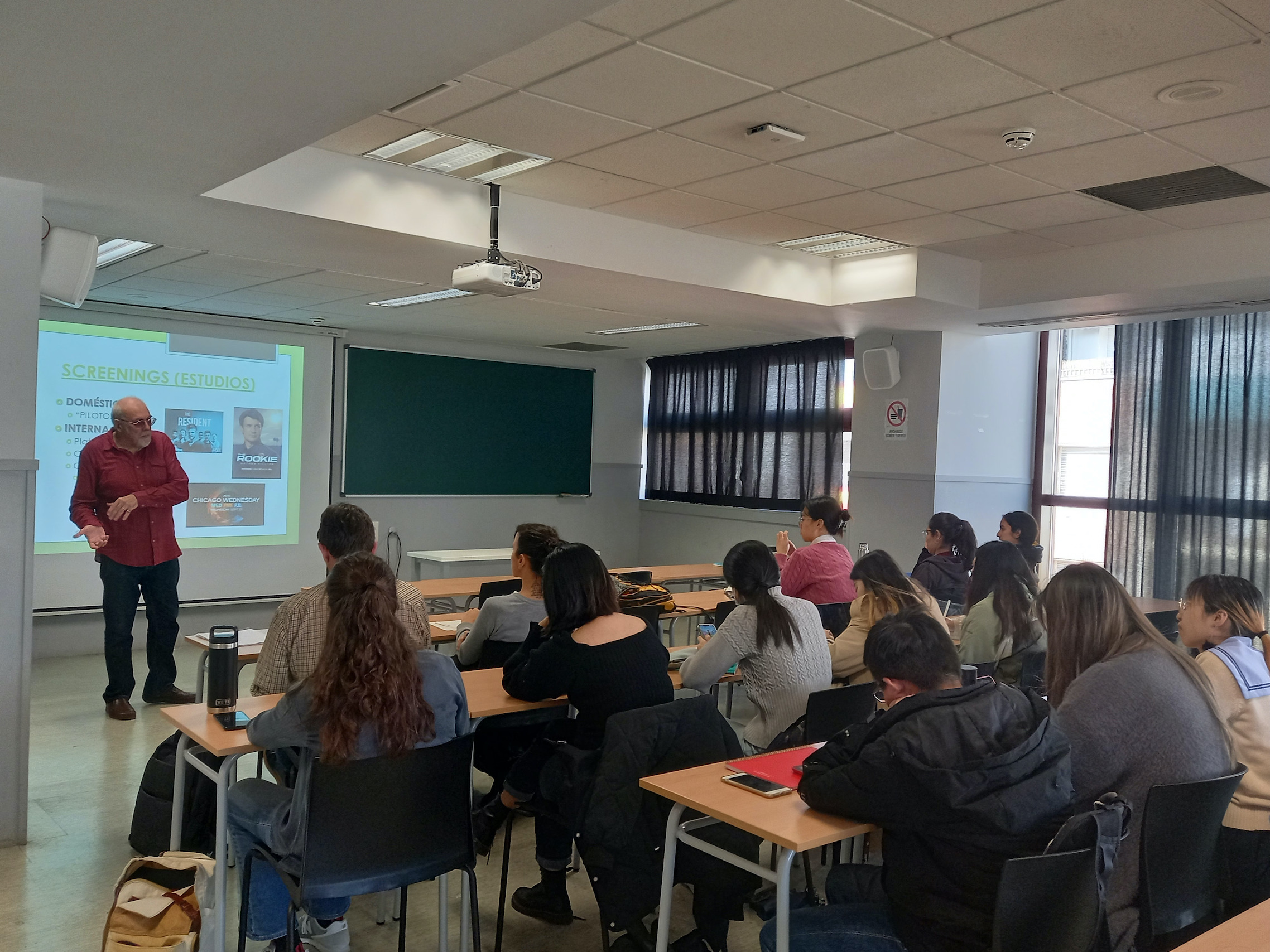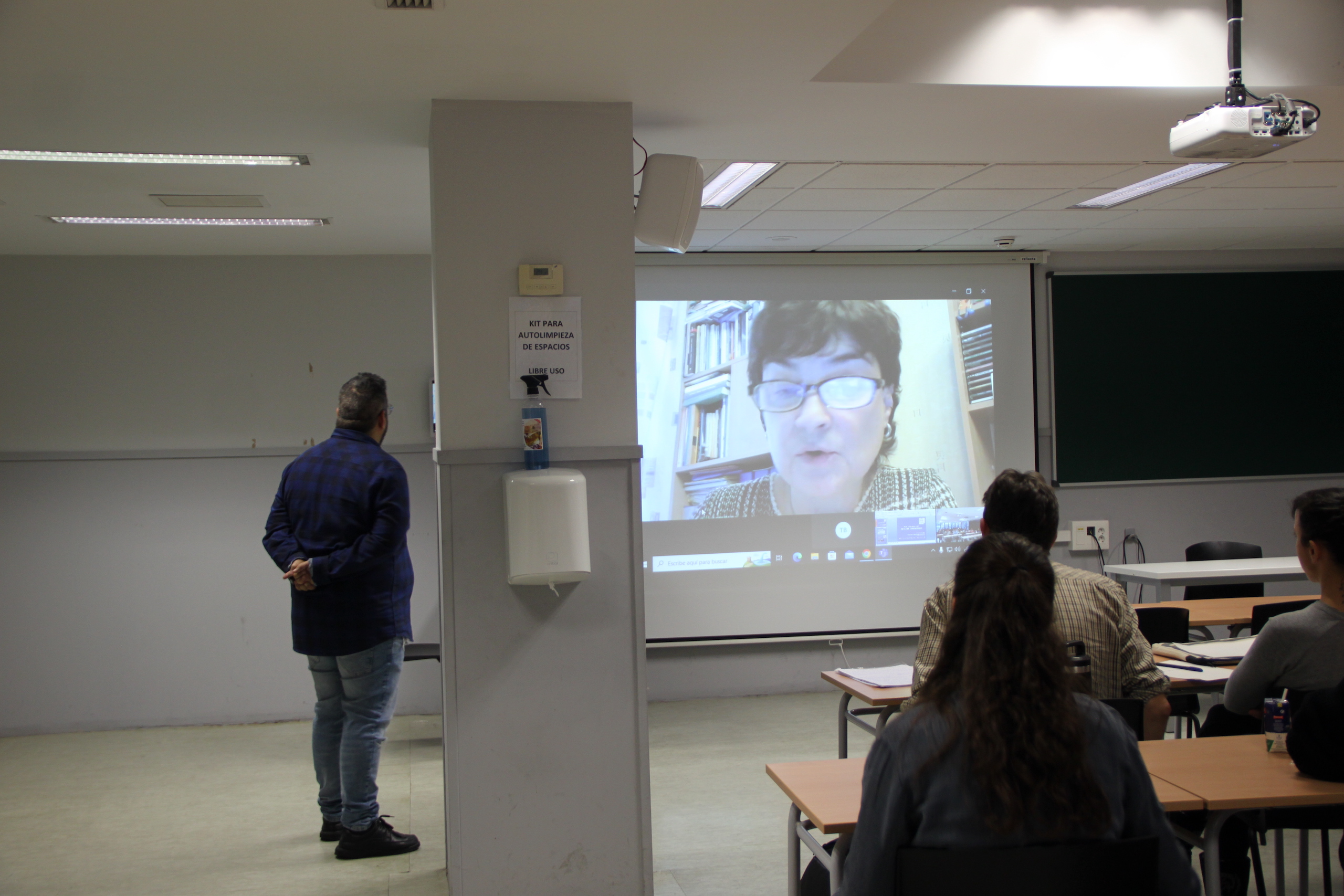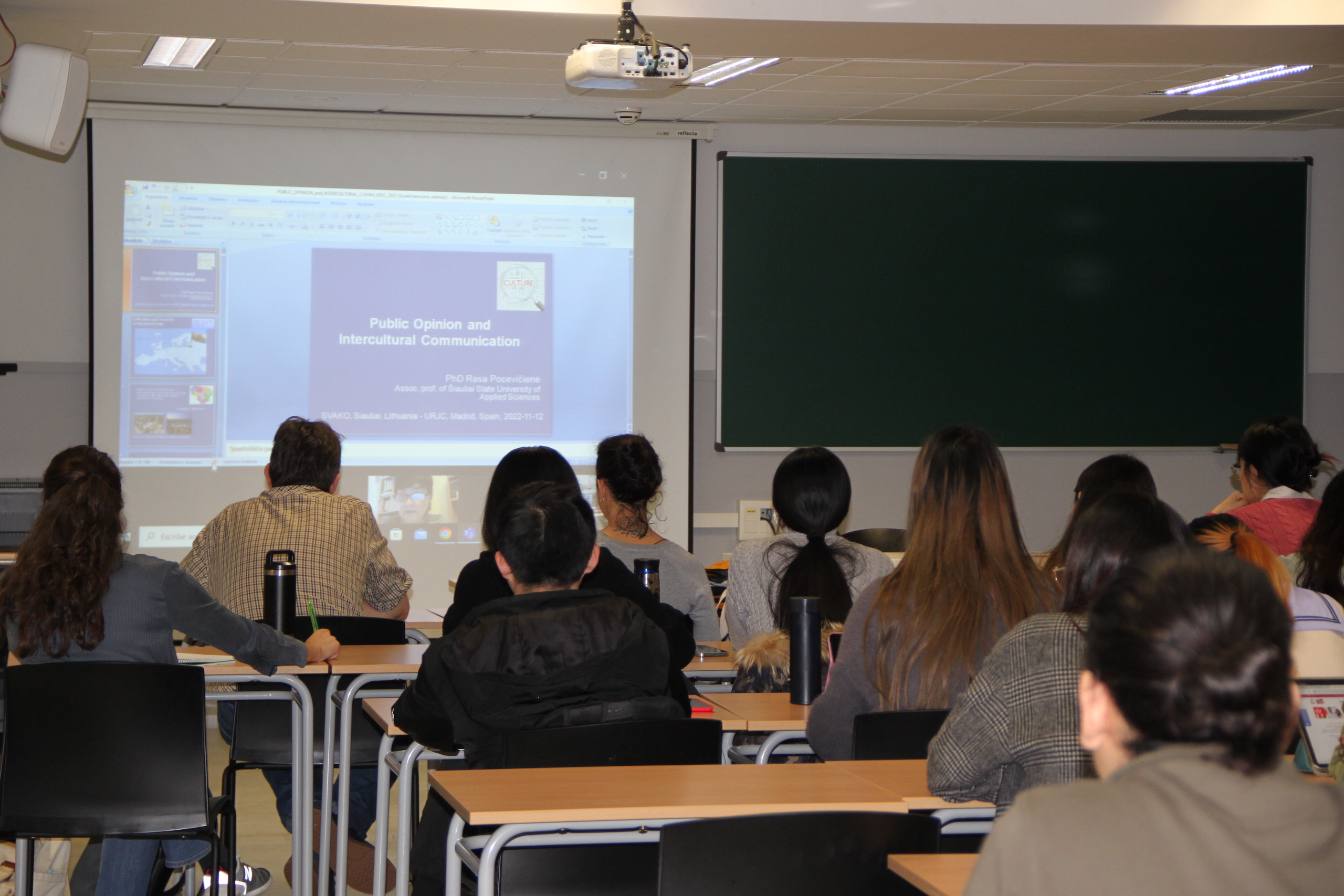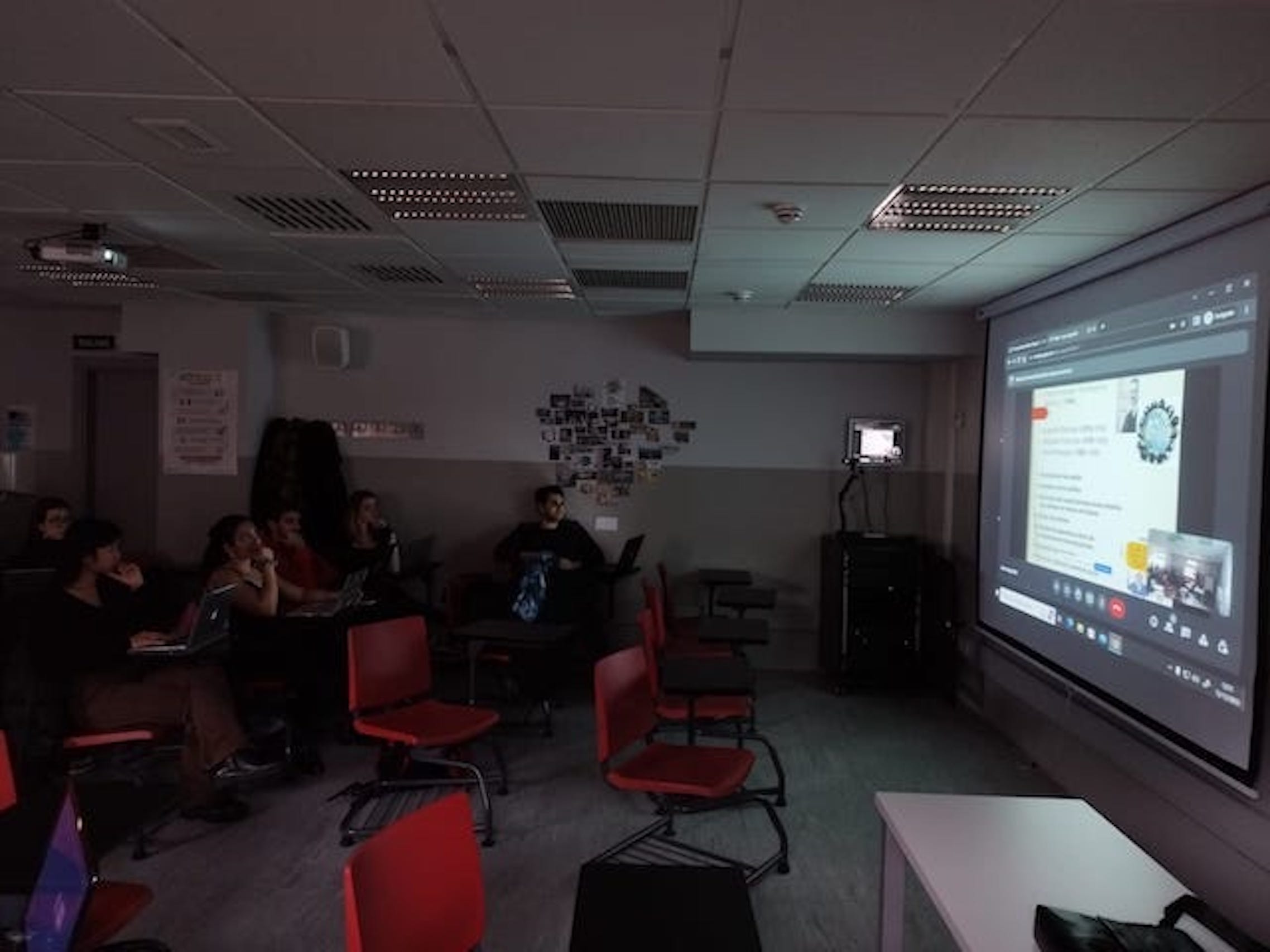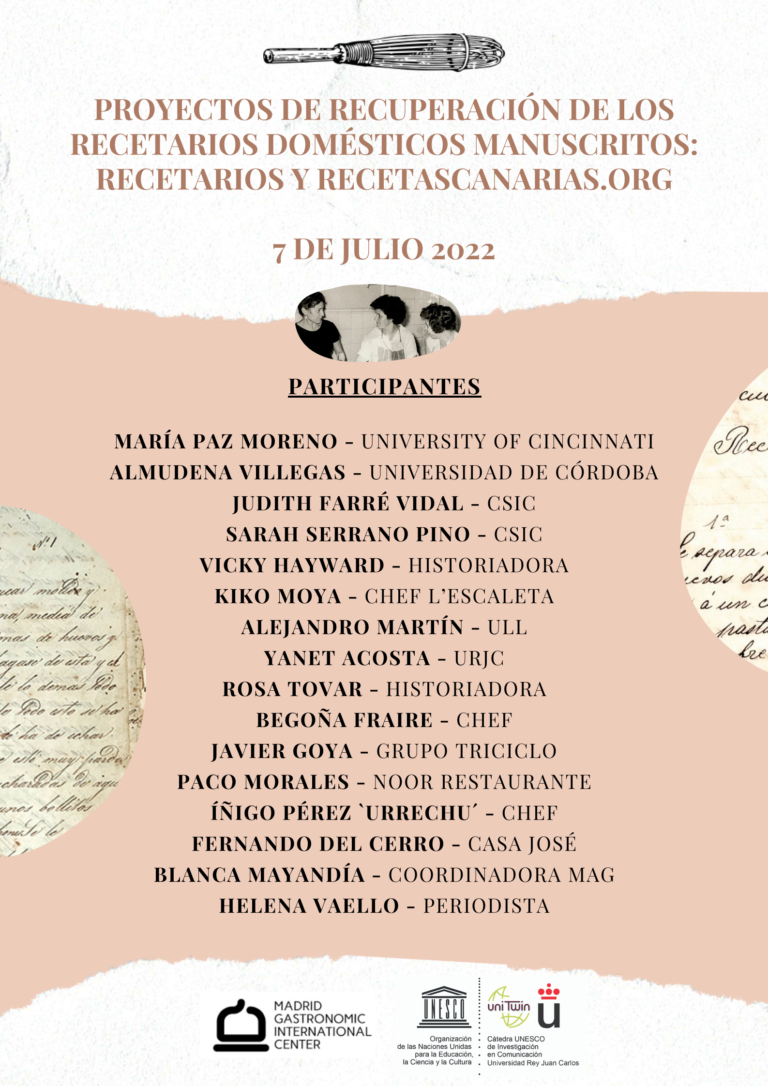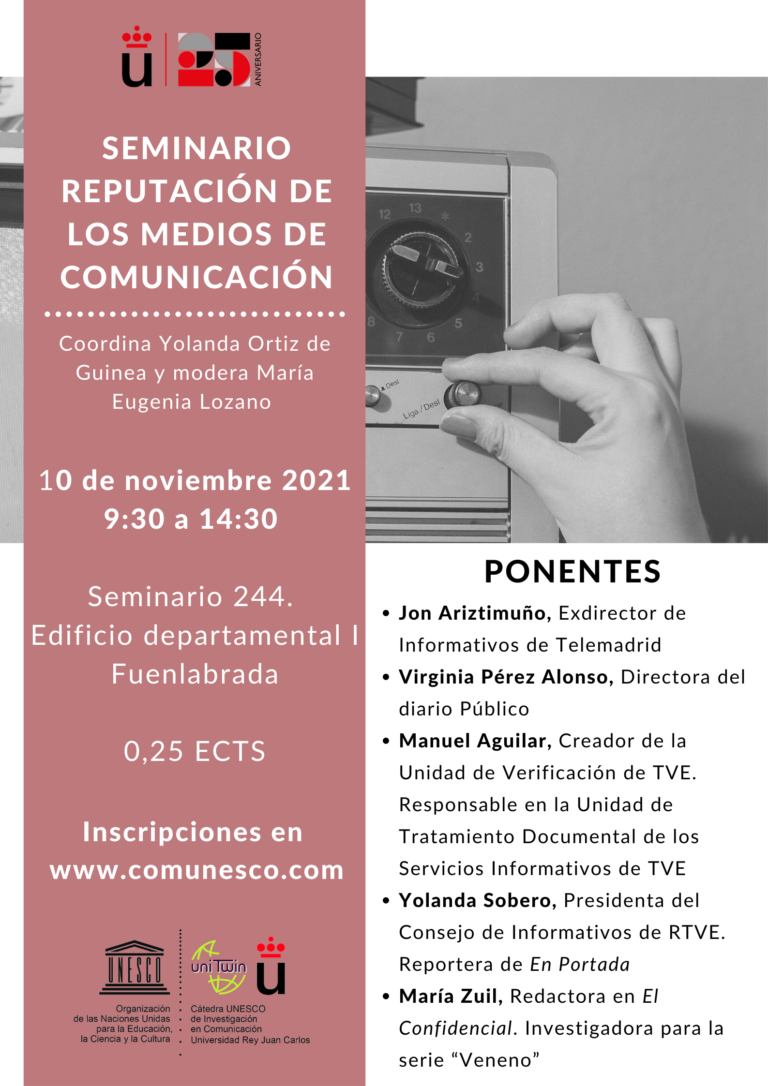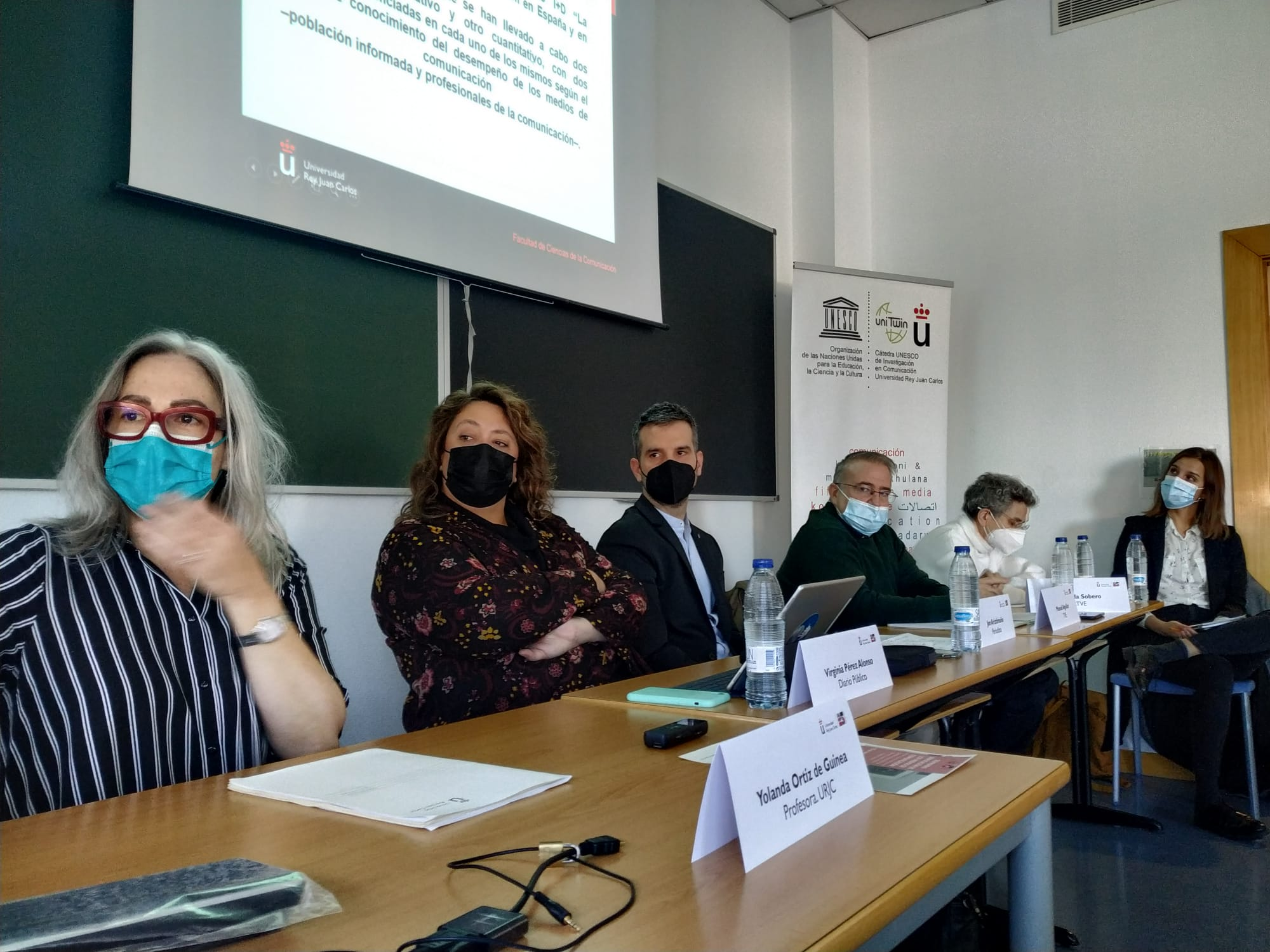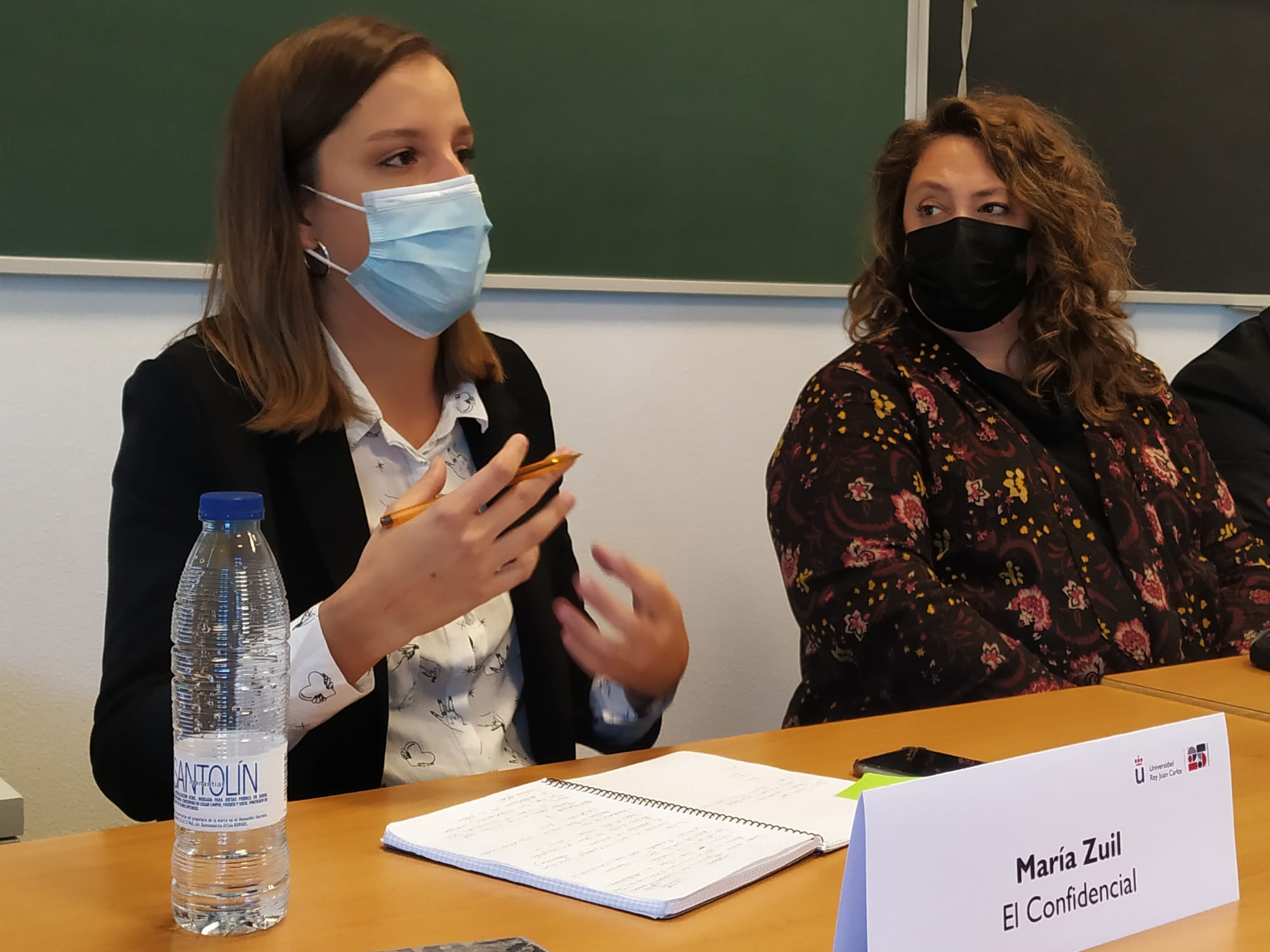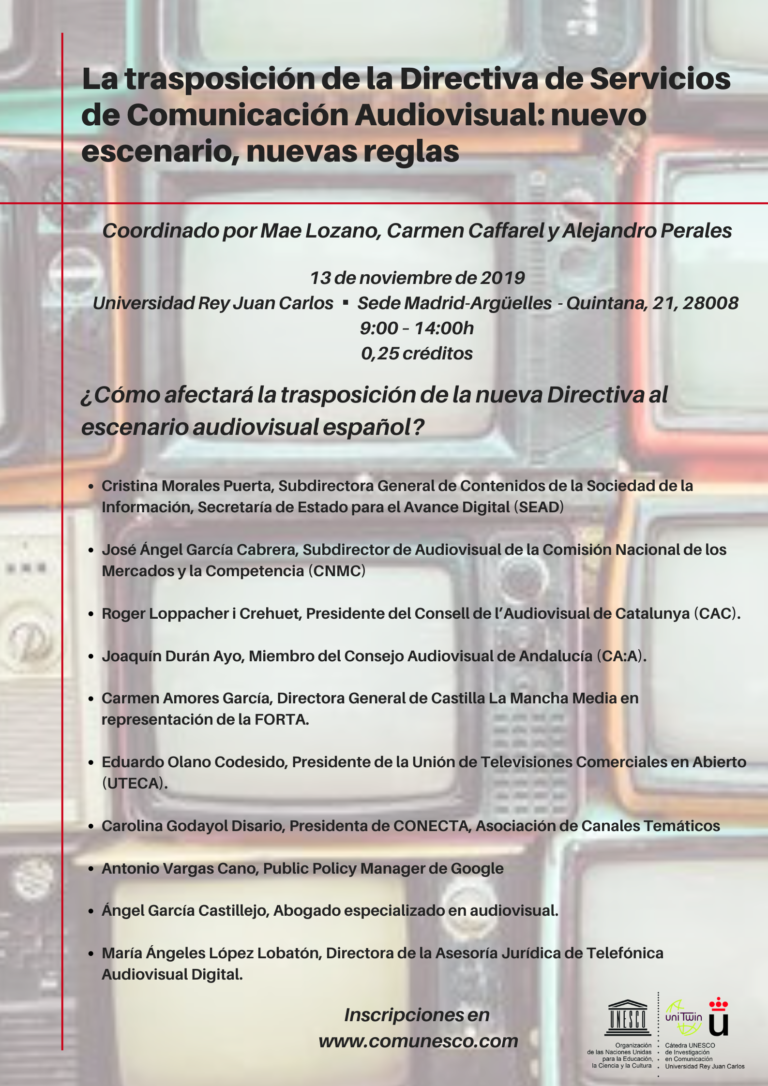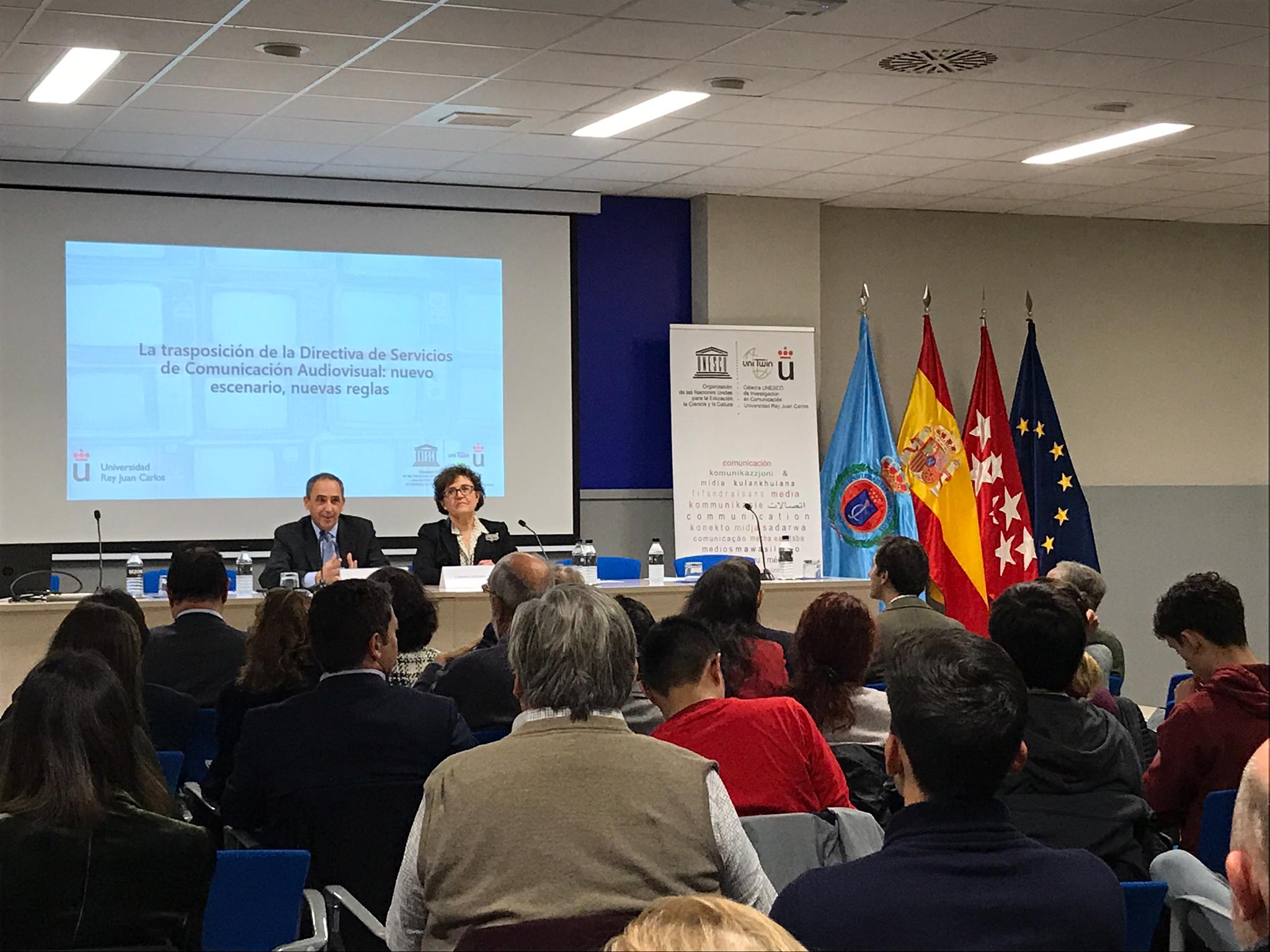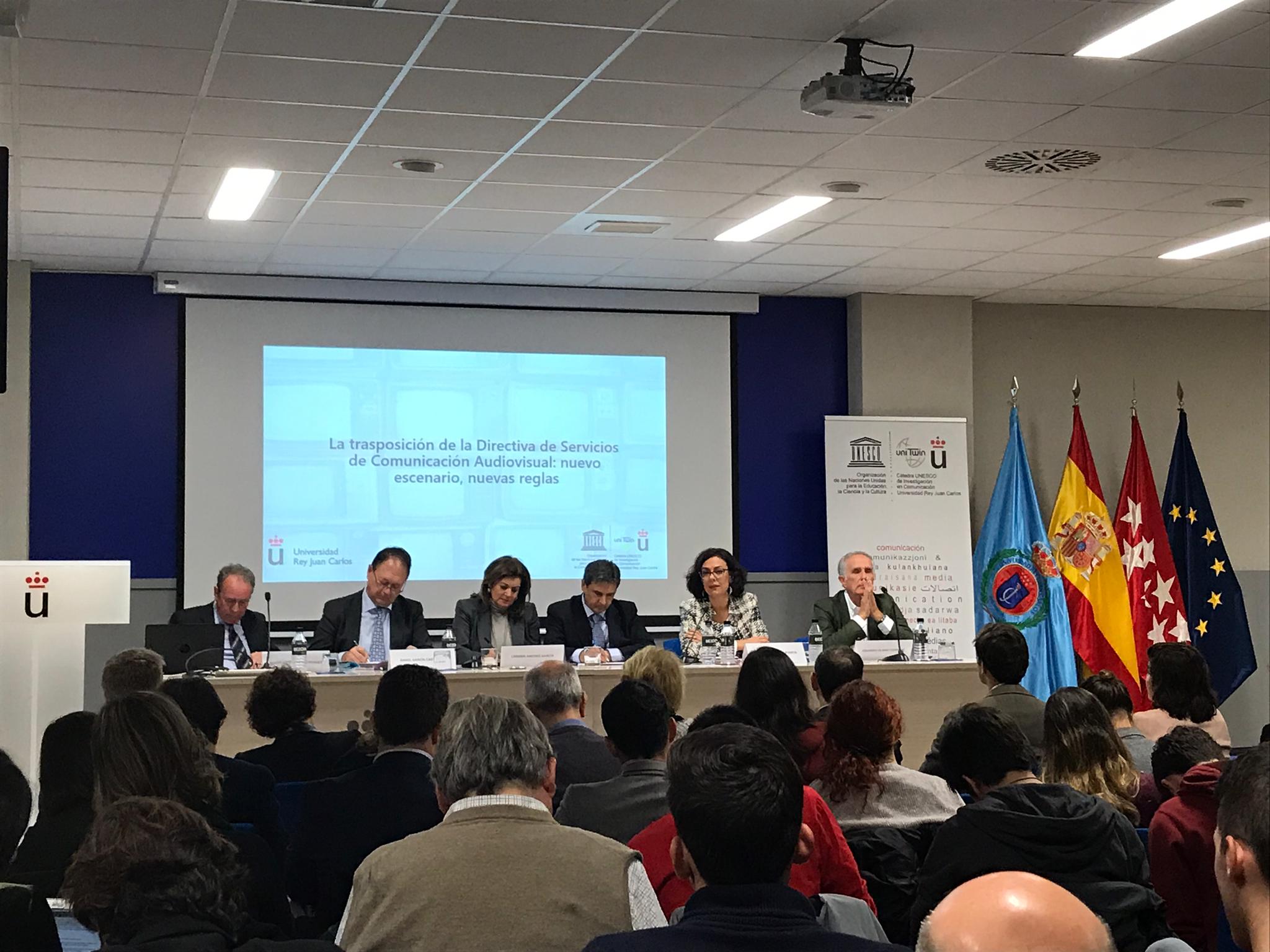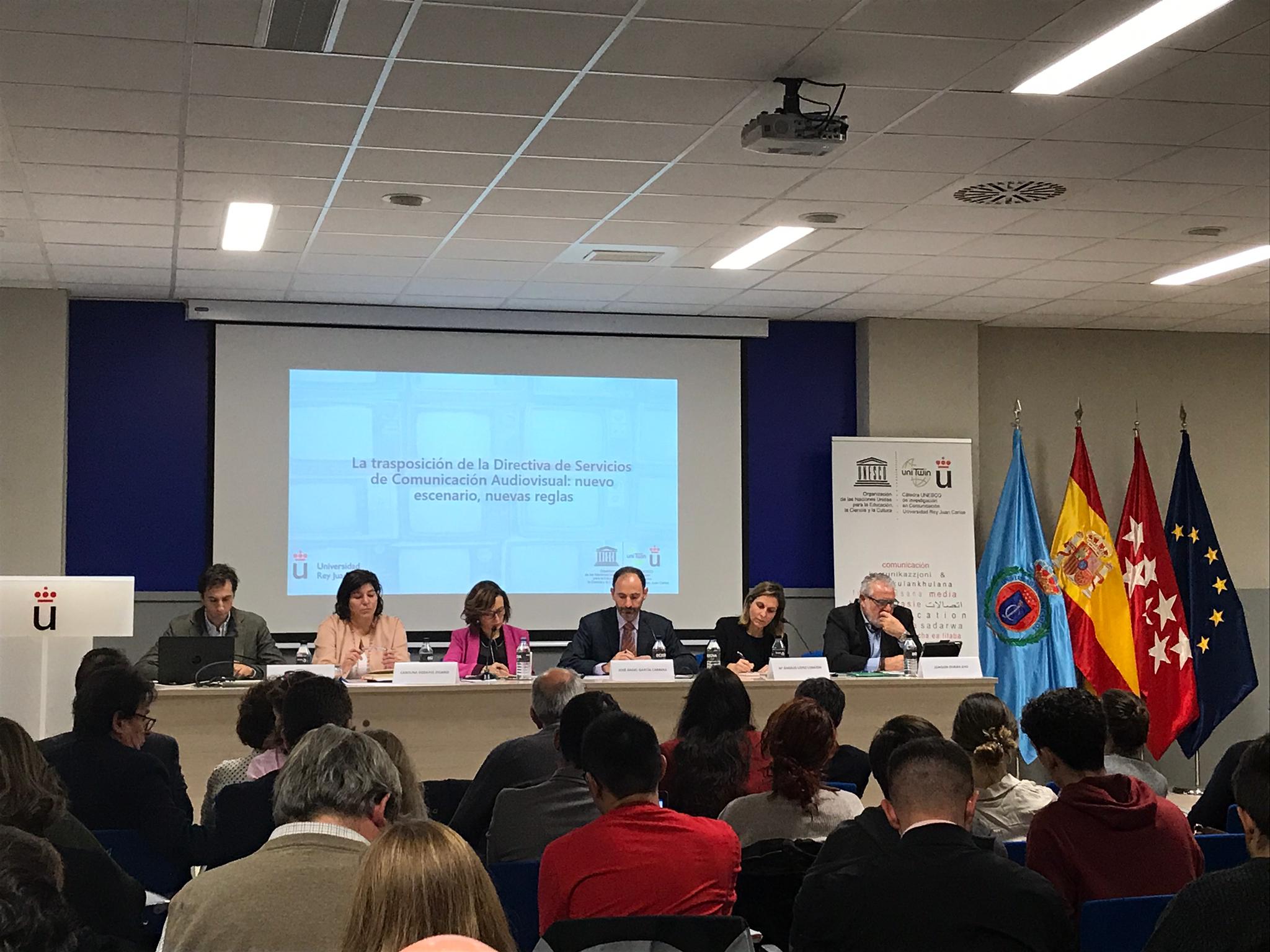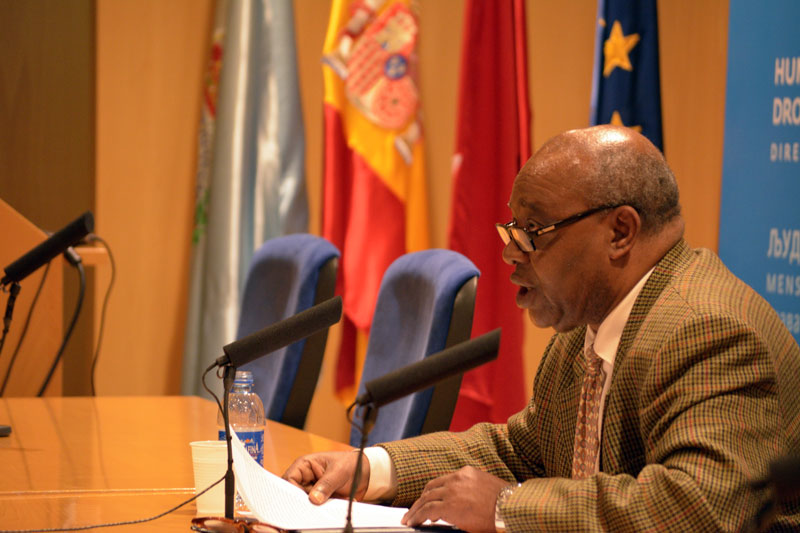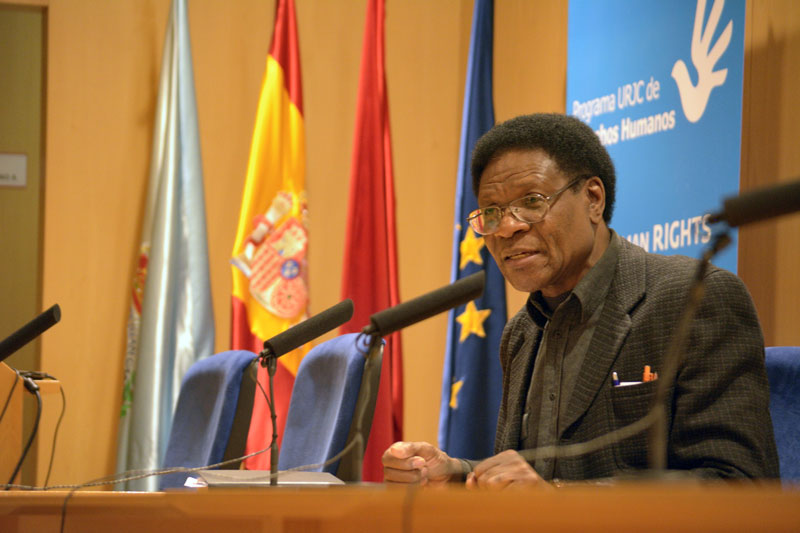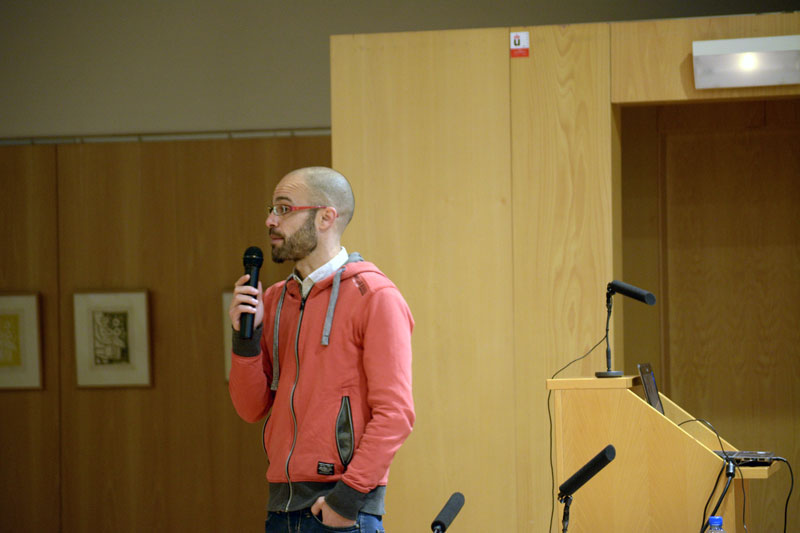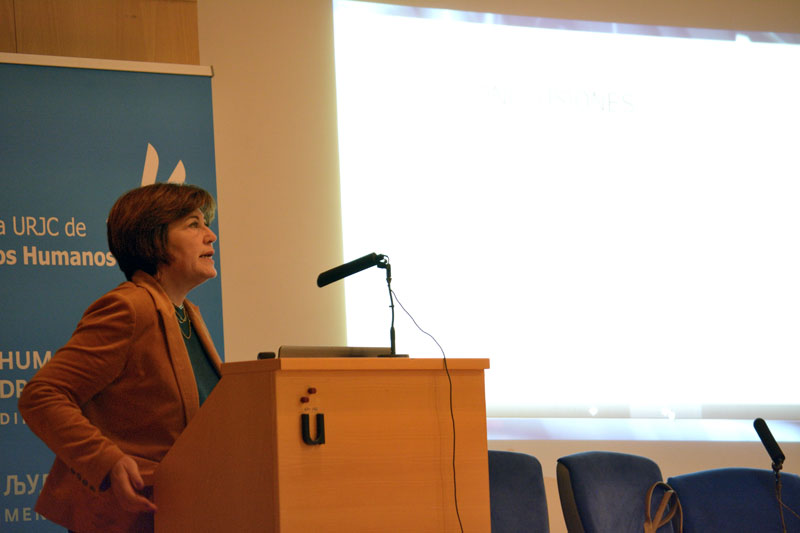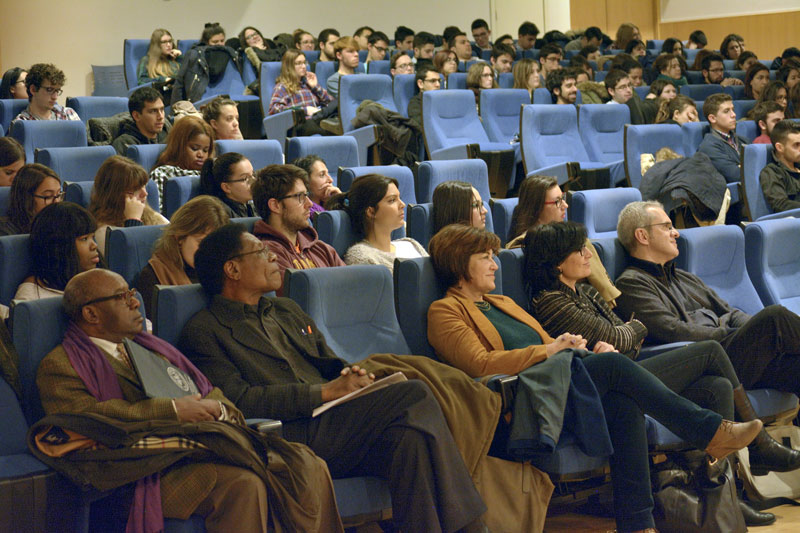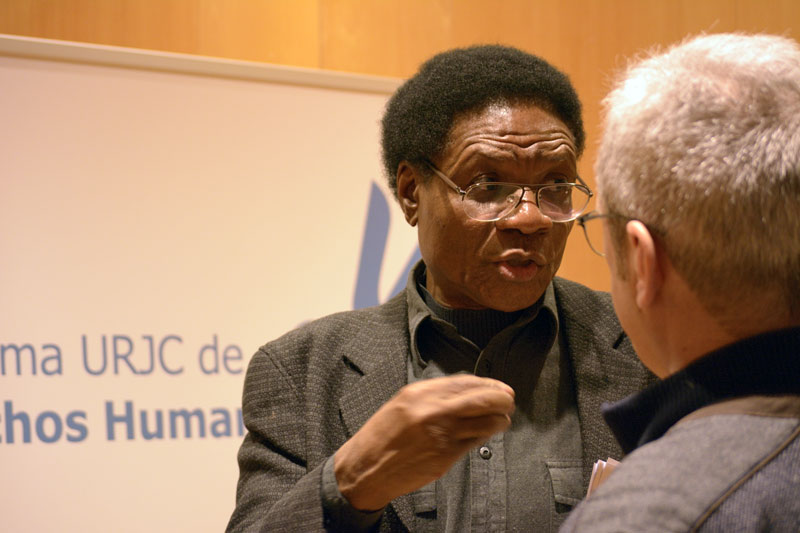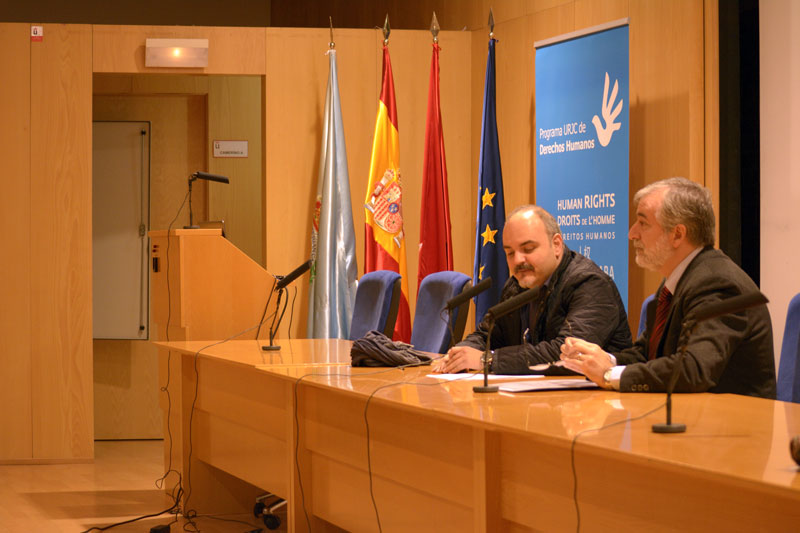The reputation of journalists: Vision of the correspondents on the situation of the profession
Coordinators: Yolanda Ortiz of Guinea Ayala and Mrs. Eugenia Lozano Lopez
- DAY: 16 November 2023
- DURATION: 3 hours (of 10 a 13 hours)
- CREDITS: 0,15
- MODALITY: In person, Degree Hall of the Departmental Building I, Fuenlabrada Campus.
- Accede to the program
- registration here
This seminar is a continuation of other similar days, held in light of the research project of the call for 2017 of the MINECO National R + D + i Plan (Ministry of Economy and Competitiveness) titledThe reputation of the media in Spain and Europe (2018-20) (number CSO2017-87513-R).
On this occasion, will be analyzed, with the help of experienced professionals, the situation of correspondents in relation to the reputation of the media; according to Reuters Institute Digital News Report 2023, in Spain, “interest in the news has fallen 34 points from 2015, one of the biggest drops in the report. Although for the first time since 2017 the loss of trust in news in general has stopped (in a 33%), distrust has reached its highest figure in the nine years covered by the sample (40%), and is especially high among those under 45 years.”
Conference on victims and perpetrators of Francoism in the media
Coordinators: Maria Eugenia Lozano Lopez and Yolanda Ortiz of Guinea Ayala
- Day: Wednesday, 15 November 2023
- Duration: 3 hours (10:00h-13:00h)
- Credits: In process
- I International Colloquium Cultural Mutation: in person, Degree Hall of the Departmental Building, Vicálvaro Campus
- Access the program
- Registers here
In September 2011, The United Nations Human Rights Council approved the resolution 18/7, appointing a Special Rapporteur on the promotion of truth, Justice, repair and guarantees of non-repetition. Its mission is to deal with transition situations following a conflict or authoritarian regime in which gross violations of human rights and serious violations of international humanitarian law have occurred.
In Spain, the entry into force of the Democratic Memory Law in 2022, as already happened with the Law of Historical Memory of 2007, It has caused a strong polarization in our society, that has been transferred, and sometimes, fed, by the media themselves, among which there is unequal treatment of the victims and perpetrators of Franco's regime, as has been proven with Franco's exhumations, Queipo de Llano or Primo de Rivera, the exhumations of the bodies of those retaliated by the Regime, and even with the change of names on the Spanish streets.
This event aims to focus on how the media address information regarding this type of events., with the help of expert journalists in Democratic Memory.
We will have the presence of the following guests:
- Carlos Pastor, director of the program “The Sixth Column” (The sixth)
- Ana Maria Pascual, journalist from the newspaper Público
- Marta Borraz, elDiario.es journalist
- Marta Nebot, journalist, participates in political gatherings in various media
- Jordi Gordon, journalist, political analyst and documentary filmmaker
III International Colloquium ‘Cultural Mutation, communication and crisis’
Coordinators: Rainer Rubira and Jacqueline Venet
- Day: 11 November 2023
- Duration: 6 hours (8:00h-14:00h)
- Credits: 0,3 ECTS
- I International Colloquium Cultural Mutation: Online and in person, Madrid-Quintana Campus
- Access the program
- registration here
- connection link
Among the speakers of III International Colloquium ‘Cultural Mutation, Communication and Crisis ’, are experts in the field of communication related to sustainability, interculturality, feminism and art. The event will feature the participation of researchers from universities in various countries., like Lithuania, Austria, Colombia and Ecuador, besides Spain.
The Colloquium has been financed through the V Call for Promotion of Innovation and Improvement of Teaching 2023, Communication Sciences Faculty, and the XVII Call for Promotion for the Organization of Academic Activities, from the Faculty of Communication Sciences, Vice-rector of University Extension of the Rey Juan Carlos University .
II International Colloquium ‘Cultural Mutation, Communication and Crisis ’
coordinate: Mr. Rainer Rubira García and Dra. Jacqueline Venet Gutiérrez
- Day: 11 November 2022
- Duration: 6 hours (8:00h-14:00h)
- Credits: 0,3 ECTS
- I International Colloquium Cultural Mutation: Online/Mixta.
- Access the program
- registration here
- connection link
Within the framework of the IV CALL FOR THE PROMOTION OF INNOVATION AND IMPROVEMENT OF TEACHING 2022, Communication Sciences Faculty, and the CALL FOR AID FOR THE ORGANIZATION OF CONGRESSES, CONFERENCES AND SEMINARS 2022, Vice President for University Extension of the URJC, is celebrated on II International Colloquium ‘Cultural Mutation, Communication and Crisis ’.
The speakers of the Colloquium, specialists from different latitudes and disciplines, They will offer master conferences on one of the issues or the convergence of the three thematic axes covered by the event: cultural mutations, communication and crises. Thus, Topics such as negotiation strategies in the audiovisual industry will be addressed, cultural representations and gender perspectives in contemporary cinema, the principles of intercultural communication and motherhood and patriarchy in post-apocalyptic cinema.
Summer course: Domestic cookbooks as an intercultural and intergenerational communication resource
Hosted by Yanet Acosta
- Day: 7 July 2022
- Hour: 09:00
- Place: Old sign of Pavia, Aranjuez
- Credits: 0,4 ECTS
- Access the program
Gastronomy is a component of great relevance in identity and is part of the intangible heritage of humanity and recipe books are living documents of the historical evolution of a society. Nevertheless, academic and research attention has always been focused on those compilations printed over the centuries, largely at the hands of men in charge of the kitchen for the political and religious spheres, thus neglecting what has been the main contribution of women to this heritage: domestic handwritten cookbooks.
Since 1989 The silent and often despised testimony of these cookbooks has begun to be the object of academic study by the Anglo-Saxon university with representatives such as Susan Leonardi, Janet Floyd y Laurel Forster y Janet Teophano, Cara de Silva and Anne L. Bower y Rebecca Ingram y Lara Anderson.
The investigations of the domestic cookbook in Spanish are signed by Isabel Gómez Turmo, Maria Angeles Perez Samper and Maria Paz Moreno. To his studies is added the publication in 2013 by the publishing house Viewer of Book of notes of stews and sweets, a recipe book dated around the year 1740 and signed by María Rosa Calvillo de Teruel, that collects a selection of handwritten recipes of a domestic nature of great historical value to understand the culinary uses and customs in the bourgeois homes of the 18th century in Andalusia.
Following this impulse in various Spanish autonomous communities, work has begun to search and catalog this documentation, which is increasingly receiving greater consideration.. Among other rescue initiatives, localization and disclosure include the project of the research team "Palingestos" of the University of La Laguna, in which the URJC UNESCO Chair in Communication Research also participates through one of its researchers, and what is called recetascanarias.org
put in common working methodologies and disseminating the relevance of this heritage which is an intergenerational and intercultural communication resource, mostly among women, is the goal of this summer course, as well as transferring this knowledge to professional cooks and to those who wish to launch recovery projects for this type of cultural heritage.
I Seminar on Suicide Prevention: Let's talk about suicide, let's break the taboo.
Coordinated by the Animals and Society Chair
- Day: 10 June 2022
- Hour: 09:00
- Place: Of. from athens, s/n
- Credits: 0,5 ECTS
- Access the program
The number of suicides in 2020 in Spain grew up in 270 personas, until the 3.941 suicides, so in Spain they commit suicide on average 11 people every day. This figure means that the suicide rate in Spain is 8,31 for each 100.000 population.
For every suicide there are many more who attempt suicide or have severe suicidal ideation. Suicidal behavior has a profound impact on families and communities and remains a universal challenge affecting millions of people.. Reducing suicide mortality is of global importance and a vital public health consideration..
In this situation, the Animals and Society Chair mobilizes its resources to work together to reduce the numbers, for improving the lives behind those figures. The necessarily multidisciplinary and multi-focus approach will bring together professionals who, from different fields, contribute their vision to improve aspects such as: prevention, emotional strengthening strategies, intervention during suicidal behavior and finally the treatment of suicide in all its complexity as news.
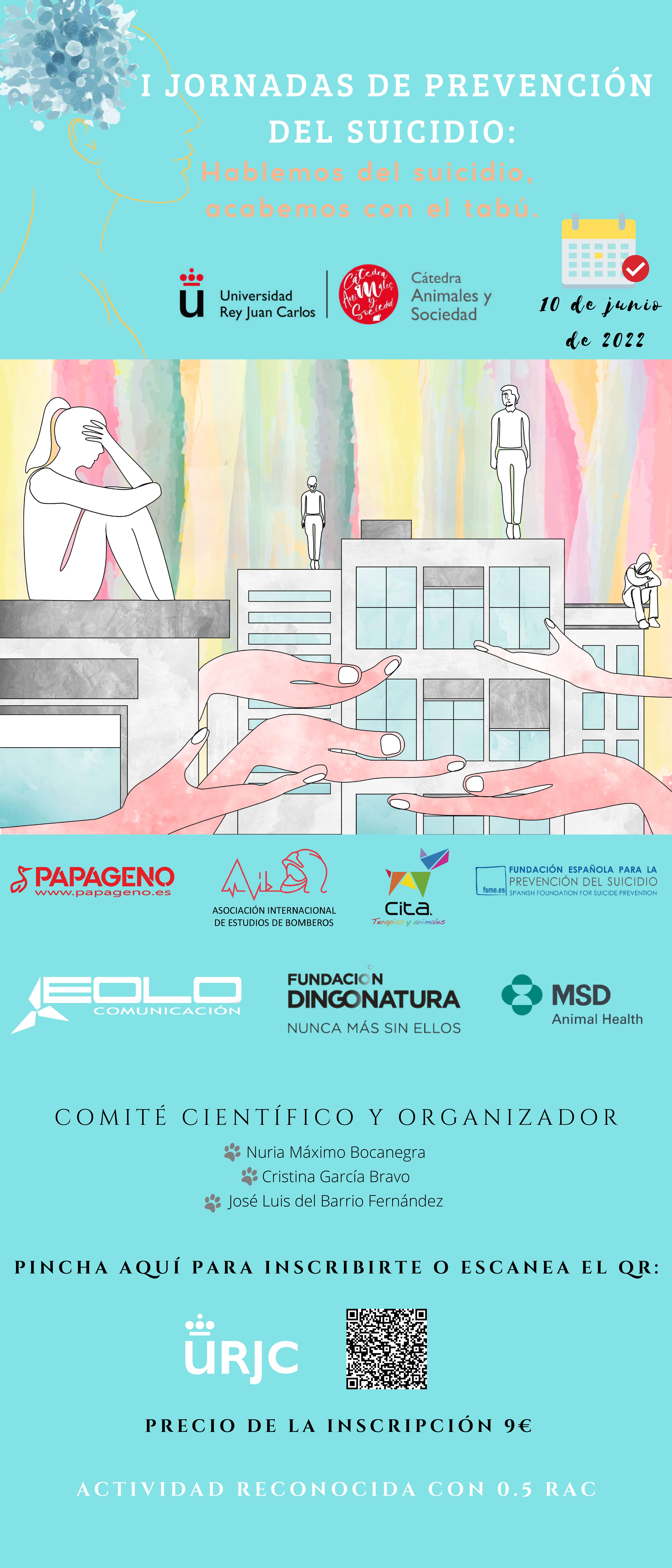
Representational distance between expert narration and local stories: a reflection on the politics of evidence in the field of historical memory
Within the framework of the International Colloquium and Permanent Research Seminar 'Cultural Mutation, Communication and Crisis ’
- Day: 2 June 2022
- Hour: 12:00
- Place: Graduation Hall – Departmental Building, Campus of Fuenlabrada
- Access the recording of the event
The presented work analyzes the epistemological limits of the narration product of the specialized works on memory of the violent past. It is a dialectical exercise between the anthropology of violence and hermeneutic phenomenology, that proposes a self-critical look from inside the expert system. We propose the existence of a necessary representational distance (not contingent) between the story as a form of local expression and its translation into a narration that is projected outside the context in which the local stories have been produced. The article concludes that, rather than the very experience of violence represented in such stories, it is the logic of the expert system that draws the contours of the politics of evidence in the field of memory.
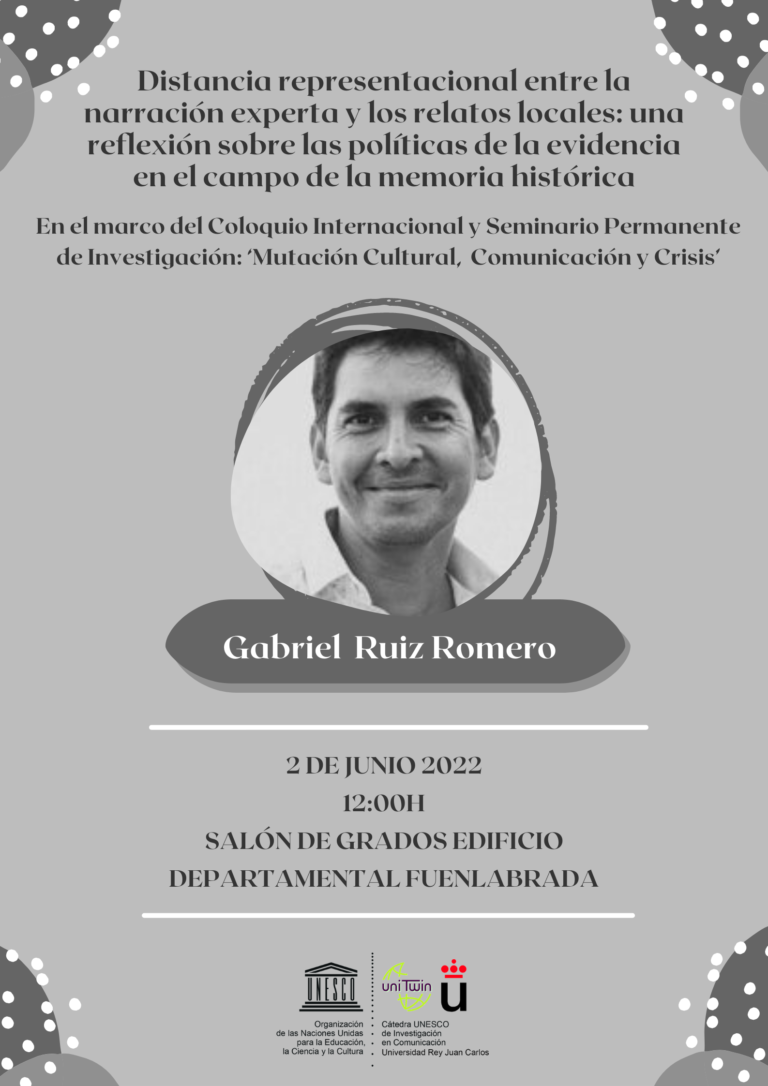
International Colloquium and Permanent Research Seminar ‘Cultural Mutation, Communication and Crisis ’
Coordinated by Rainer Rubira and Jacqueline Venet
- Day: 30 November 2021
- Hour: 09:00 – 15:00h
- Place: Online
- Credits: 0.30 ECTS
- Access the program
Our starting point is built around the triad communication, crisis and culture, mediated by a change that opts for a more inclusive and expansive concept of each of the sections.
A) Yes, we amplify it to bring out factors of a cultural nature, human, social, politics, economic or moral, in order to enhance humanistic derivatives. Like a palimpsest, political layers are added to the three concepts, social, cultural, that make this a global historical macro phenomenon of still unpredictable consequences. We assume the crisis as an interruption of the functioning of the usual course of daily practices, provoking, in a synchronized way, various dysfunctions in multiple social fields. This generates a general state of suspension of well-being. We discard the vision that defines it as a setback, and also as a stimulus, for the sake of assuming insecurity and accepting risks and social permutations. Crises are no longer a contextual element to be active protagonists. Of all his possible ways to describe them, we are interested in the cultural dimensions and their permutations from the different communicative processes as speeches or illustrative stories of these turbulent times.
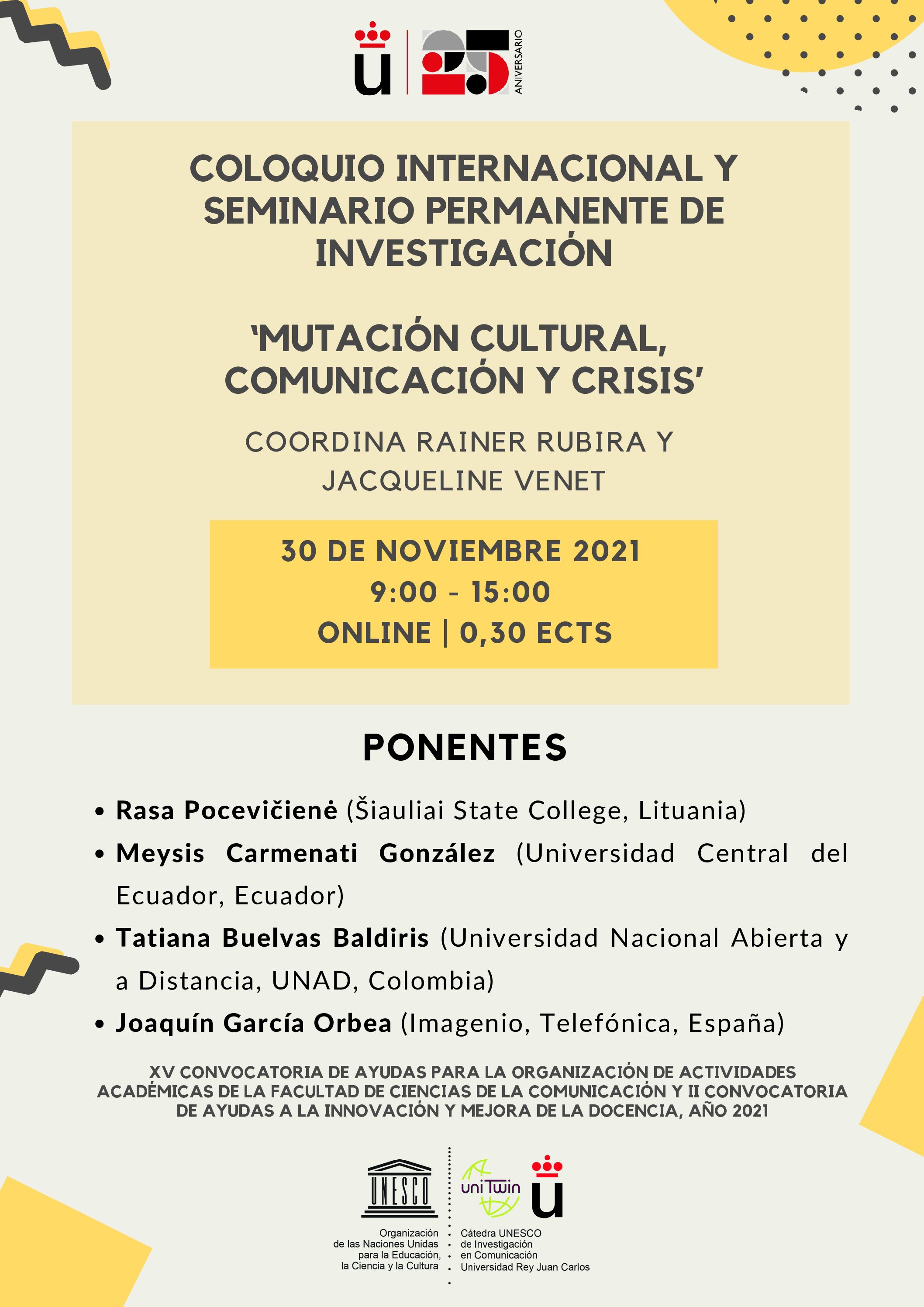
Media Reputation Seminar: Fake News and declarative journalism
Coordinated by Yolanda Ortiz from Guinea and María Eugenia Lozano
- Day: 10 November 2021
- Hour: 09:30 – 14:30h
- Place: Seminar 244 - Departmental building I, Campus of Fuenlabrada
- Credits: 0.25 ECTS
This is the fourth seminar organized by our Chair around the reputation of the media, always from different angles and points of interest, to continue deepening this concept.
There are not a few authors who have alerted us to the use and abuse of declarative journalism. Within the profession, the journalist Arsenio Escolar described it as "one of the great evils of our trade" in an article entitled A new virus further aggravates declarative journalism, published in 2015 in the APM magazine Cuadernos de Periodistas, especially when it invades political information until it monopolizes it and makes it almost its only record. Of the abuse of statements without context or analysis by professionals, powered by social networks to misinformation, there may only be one step, or none.
This time we pretend analyze and debate with significant representatives of the national media, and verification platforms, your vision of the possible interrelation between so-called declarative journalism and Fake News.
Debate day for the renewal of the Decalogue on climate change communication
Coordinated by Gemma Teso and Carlos Lozano
The Climate Change Communication Observatory is dedicated to applied research for him development of tools that allow improving communication of the Communication on climate change. It is It constitutes a meeting space between communication professionals Climate change (CC), communication researchers and the experts in different areas of knowledge or activity linked to this climate change and ecological transition. The interaction between researchers and professionals who apply un expert and inclusive judgment reinforces the necessary bond and commitmentfor him exchange of knowledge upon the climate crisis, the eco-social context and communication of this phenomenon. The ultimate end is guarantee quality communication that empowers to the citizens Faced with the great changes that they will have to face to combat global warming and adapt to the new living conditions that will bring us an increase set at least by the IPCC at + 1.5ºC.
A selection of 36 experts to be distributed in three working groups during the day. Each one of these groups will consist of communication professionals Climate change (CC), especially environmental journalists from different media and supports and experts in different areas of knowledge or activity linked to this climate change and ecological transition:scientists specialized in climate science, socioitdog, psychologists, political scientists, entrepreneurs and climate activists and representatives of the main institutions. The communication researchers of the Observatory they will moderate the debates and supervise the development of the day.
- Day: 2 October 2021
- Hour: 09:00 – 15:00h
- Place: Madrid-Quintana Headquarters
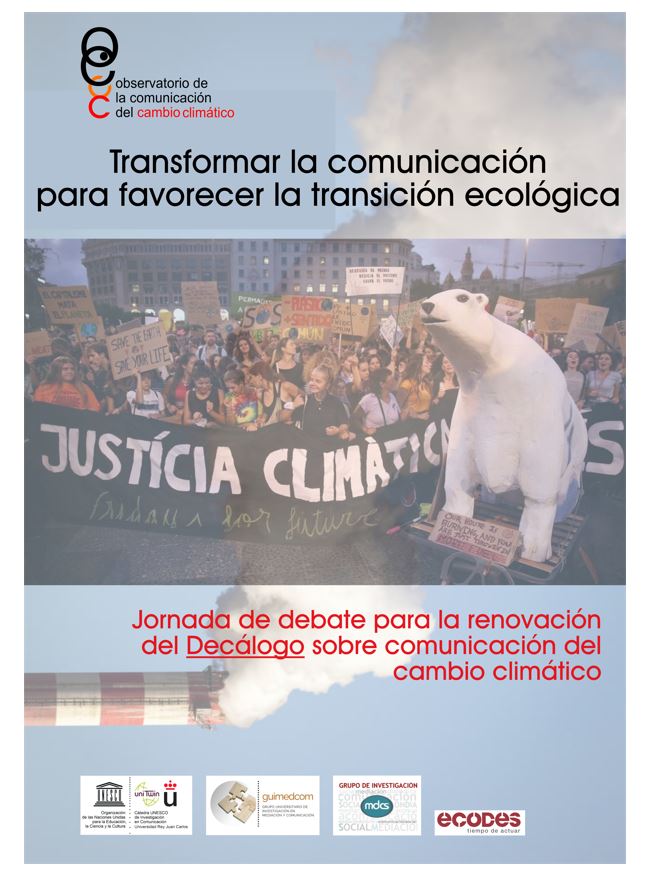
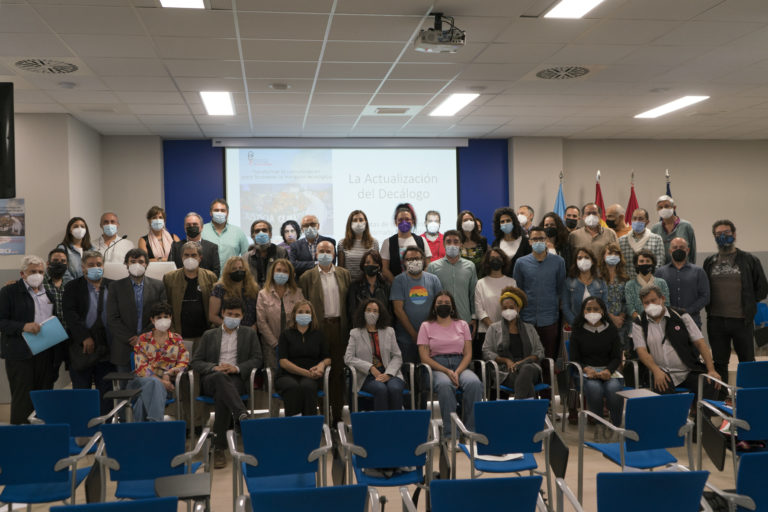
Gastronomic journalism conference, research and intercultural communication
Coordinated by María Yanet Acosta Meneses
The newly appointed by President-elect Joe Biden as United States Ambassador to the UN Linda Thomas-Greenfield has revolutionized the world of diplomacy with a new term. “Gumbo Diplomacy”. In this play on words in front of the usual and hegemonic "Bunboat Diplomacy" the new African-American ambassador raised in Louisiana has put on the table the gastronomy how powerful intercultural communication tool. Gumbo is a Louisiana Creole cuisine stew resulting from the historical fusion of ingredients and cultures. Linda Thomas-Greenfield during her appointment last November explained that “wherever in the world I find myself, I invited people of different origins and beliefs to help me make roux and chop onions for the Holy Trinity of a homemade gumbo. It was my way of breaking down barriers, connect with people and start seeing myself on a human level ".
And it is from that place that the new ambassador wants to confront the interconnected conflicts in this global world such as the pandemic., the climate change crisis, mass migration and extreme poverty. Taking advantage of this current hanger, as well as the growing interest of the scientific community from the Humanities and the enthusiasm of the students before a subject that seems to be fashionable in the media, we propose these Conference.
- Day: 21 May 2021
- Hour: 10:00 – 14:00h
- Place: Online
- Credits: 0.40 ECTS
- Download the program
- Streaming of the event
- Conference Book
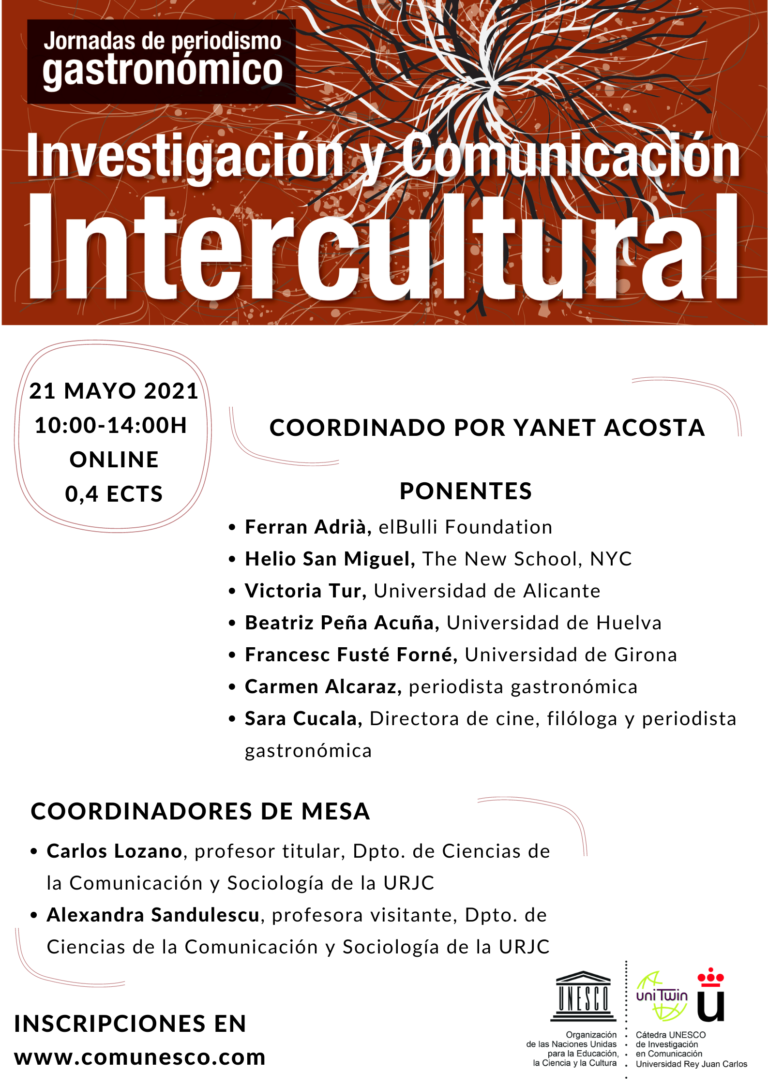
The management of public opinion and crisis communication in contemporary times
Coordinated by Rainer Rubira García and Jacqueline Venet Gutiérrez
This initiative aims to focus on communication processes for the management of public opinion in crisis situations from an innovative point of view. We propose to address aspects have as thread understand, reflect on and interpret the boundaries between communication, public opinion and crisis management, as convergent and complementary fields. The mission of the activity that we propose could be summarized based on the collective interest in studying communication processes, public opinion and crisis management from an innovative point of view taking into account the impact of technologies, but also the changes in public that have occurred in the last decade.
- Day: 30 November 2020
- Hour: 9:00-14:00h
- Place: Online
- Credits: 0.30 ECTS
- Download the program
- Download program in English
- Download poster in English
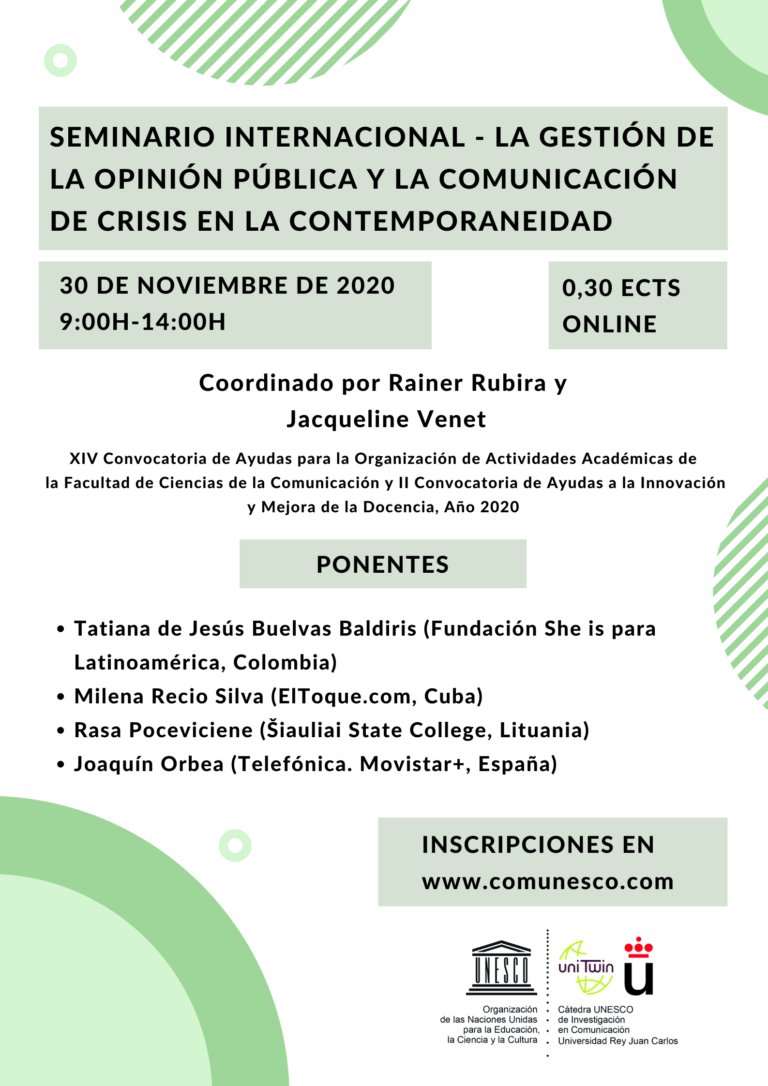
MapCom Latinoamérica: proposals to configure an interactive communication research map
XV Congress of the Latin American Association of Communication Researchers (ALAIC)
Panel with specialists to present the main results of the MapCom project about communication research (2007-2018) in Spanish universities: doctoral thesis, R&D projects, Scientific articles, books, communications to congresses and research groups and, at the same time, learn about and discuss the initiatives and contributions that other Latin American researchers are making in the same direction.
The main objectives pursued in this event is to establish strategies and methodologies for the design of geomatic maps that can become a working tool for all Ibero-American researchers focused on communication research..
- Day: 17 November 2020
- Hour: 8:00 hours (Colombia) – 14:00 hours (Spain)
- Place: Online
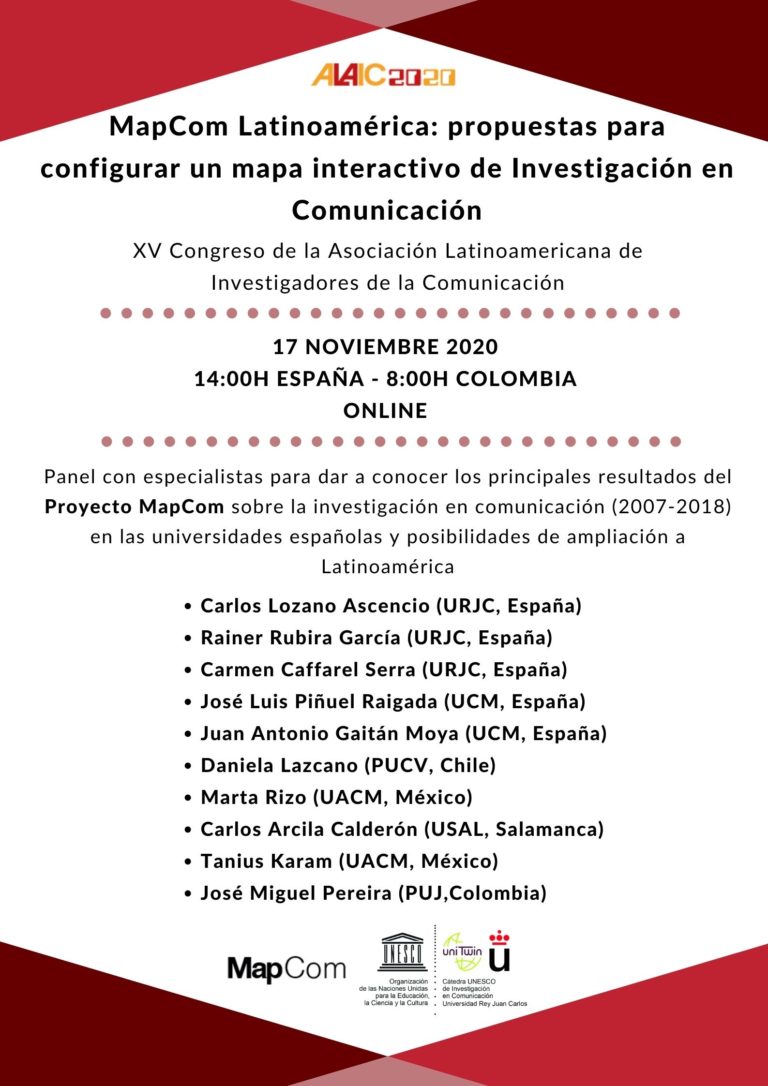
Innovation and creativity in and from the field of social communication
Rainer coordinated by Rubira
Creativity processes have attracted academic interest as an object of study in the field of Communication Sciences long. With the advent of communication technologies, the study of these phenomena has only grown in importance. For this reason, This initiative aims to focus on the processes of creation and from the communication from an innovative standpoint. We propose to address aspects have as thread understand, reflect and interpret the boundaries between communication and creativity, as convergent and complementary fields.
The mission of the activity we propose is warranted from the need to study and systematize experiences in relationships between the processes of communication and creation from an innovative standpoint taking, consider the impact of technology, but also the changes in public that have occurred in the last decade.
- Day: 25 November 2019
- Hour: 09:00 – 14:00h
- Place: Communication Sciences Faculty, Campus of Fuenlabrada - Lecture 1, Aula Magna 007
- Credits: 0.25 ECTS
- Download the program
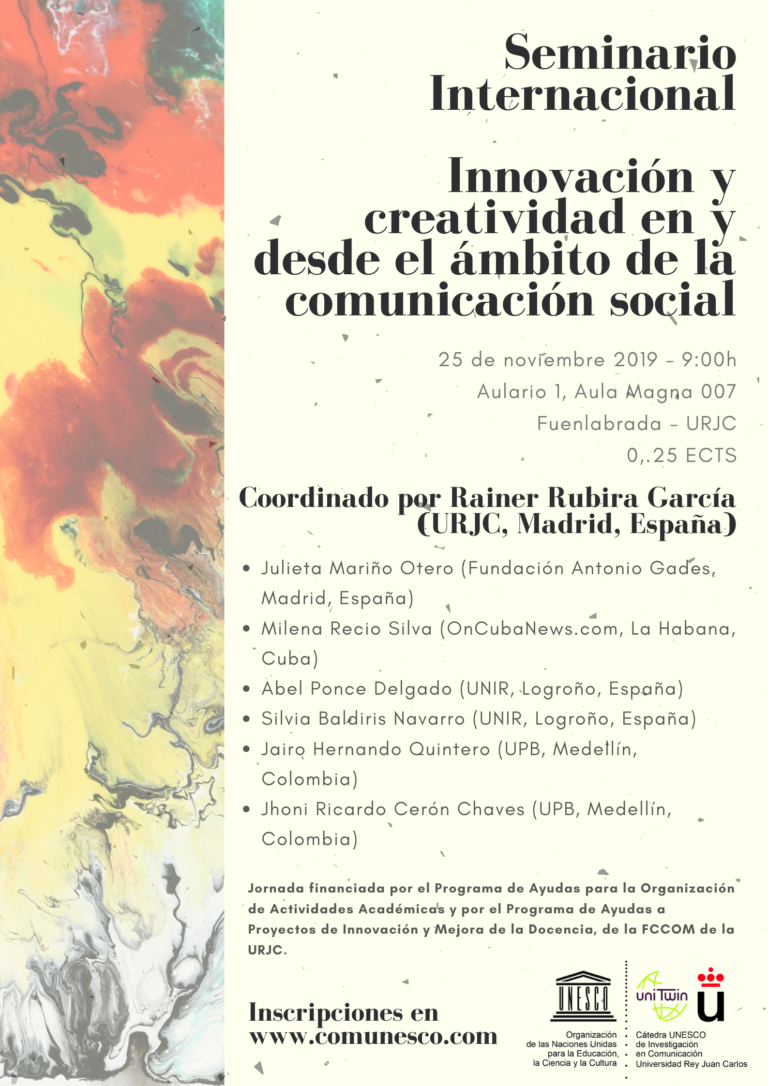
The transposition of the Directive on Audiovisual Communication Services: new scenario, new rules
Coordinated by Mae Lozano, Carmen Caffarel and Alejandro Perales
The aim of this conference is analyze changes in the audiovisual scene associated with the transposition into Spanish law of Directive (EU) 2018/1808 European Parliament and Council, of 14 of November, amending Directive audiovisual media services amending.
The round tables with the participation of experts, Administration and service providers audiovisual communication.
- Cristina Morales Door, Deputy Director General Contents Information Society, Secretary of State for the Digital Advance (SEAD).
- José Angel García Cabrera, Audiovisual deputy director of the National Commission for Markets and Competition (CNMC).
- Roger Loppacher and Crehuet, President of the Audiovisual Council of Catalonia (CAC).
- Joaquín Durán Ayo, Member of the Audiovisual Council of Andalusia (THAT:A).
- Carmen Garcia Amores, Director General of Castilla La Mancha Media on behalf of the FORTA.
- Eduardo Olano Codesido, President of the Union of Commercial Television in Open (UTECA).
- Carolina Godayol Disario, President CONECTA, Theme Channels Association.
- Antonio Vargas Cano, Public Policy Manager de Google.
- Angel Garcia Castillejo, Lawyer specializing in audiovisual.
- Maria Angeles Lopez Lobatón, Director of the Legal Department of Telefónica Digital Audiovisual.
-
- Day: 13 November 2019
- Hour: 9:00 – 14:00
- Place: • Madrid-based Arguelles Calle de Quintana, 21, 28008 Madrid
- Credits: 0,25 ECTS
- Download the program
Reputation Media: traditional media versus digital media
This conference aims to analyze and discuss with representatives meanings the national media and, both traditional and digital natives, his vision on reputation of both types of the media in Spain.
- Day: 13 November 2018
- Hour: 09:30 am
- Place: Salón de actos – Gestión, Campus of Fuenlabrada
- Credits: 0.25 ECTS
- Download the program
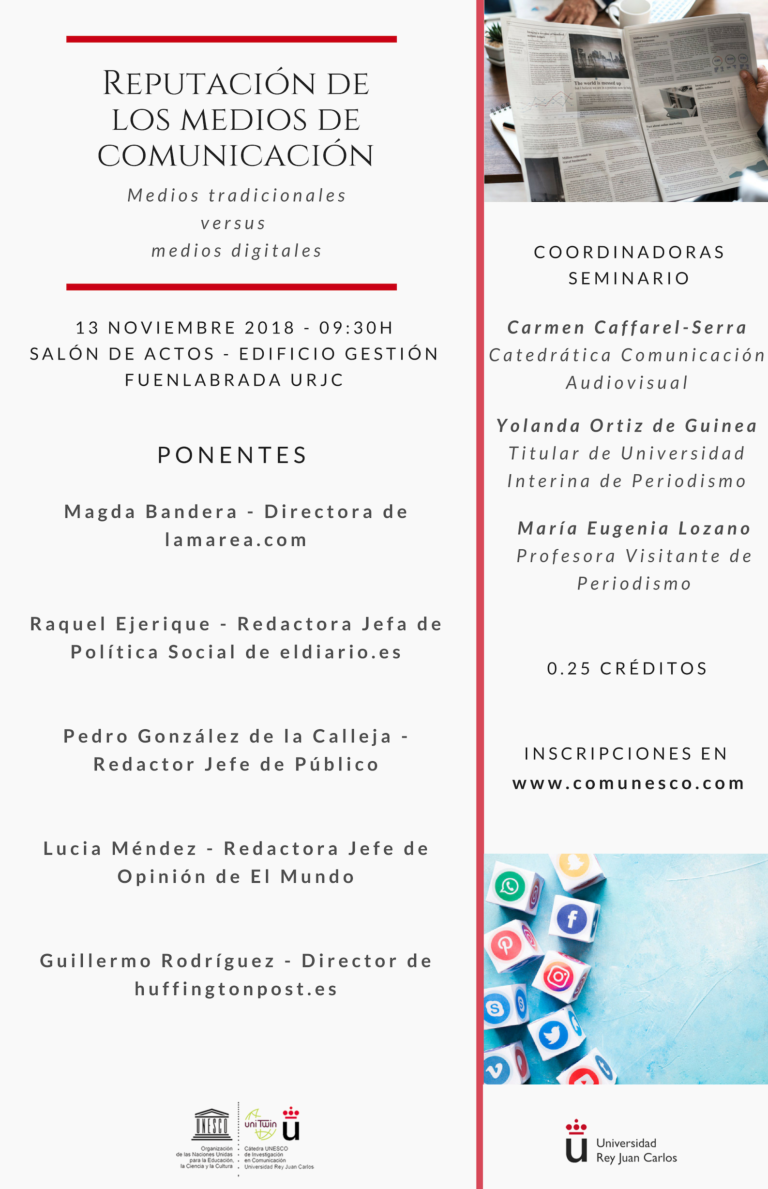
Reputation Media Communication. Dialogue between professionals and the University
It is available the presentation about "Social Media and Human Rights in Africa", from the Researcher Carlos Bajo Erro, which took place as a part of our event Africa: Communication and Human Rights Education, So close and yet so far.
The presentation can be consulted here.
- Day: 13 November 2017
- Hour: 10:00 am
- Place: Salón de actos – Gestión, Campus of Fuenlabrada
- Credits: 0.25 ECTS
- Download the program
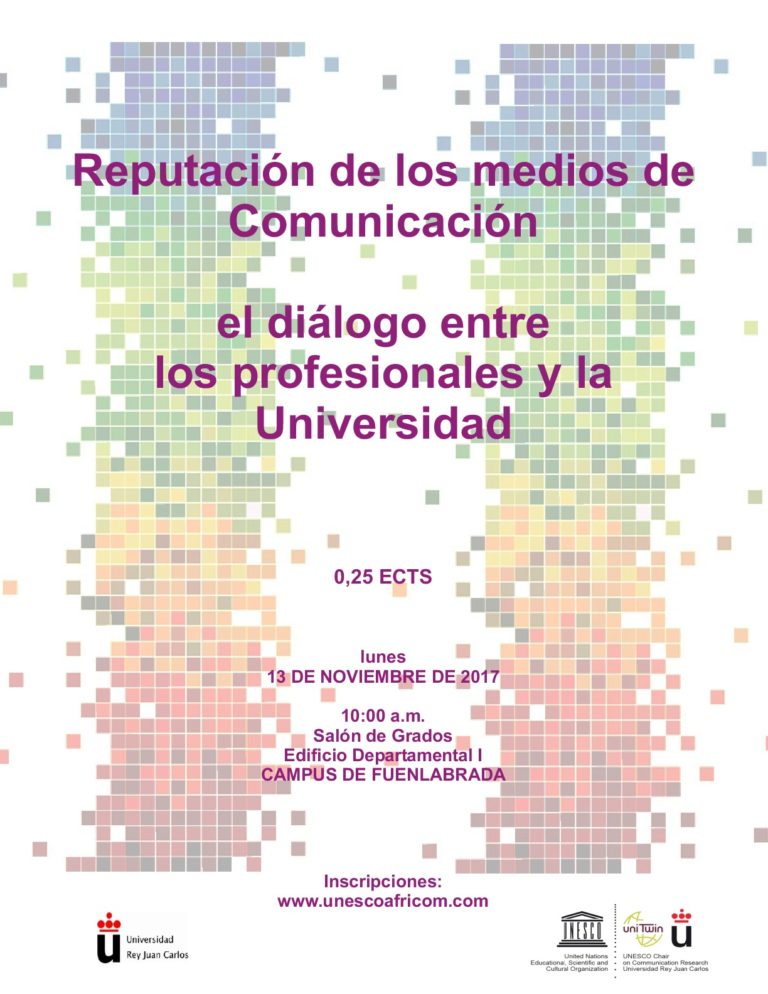
The actual Political Communication: new players, speeches and scenarios
I Ibero-American Forum of UNESCO Chairs in Communication
In order to create a space for an academic dialogue, reflection and analysis on communication and connection with citizens, the Faculty of Communication at the University of Lima inaugurated the I Iberoamerican Forum of UNESCO Chairs in Communication. Our Chair participates with a presentation by our director Carmen Caffarel.
- Days: 10 and 11 May 2016
- Place: Central Auditorium of the University of Lima, Peru.
- Download the program
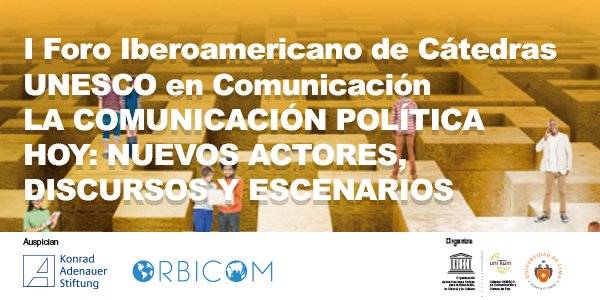
Journalists reputation
- Day: 15 October 2013
- Place: Salón de actos – Gestión, Campus of Fuenlabrada
- Inscription: Complete this form
- Information: jornada.reputacionperiodistas@urjc.es
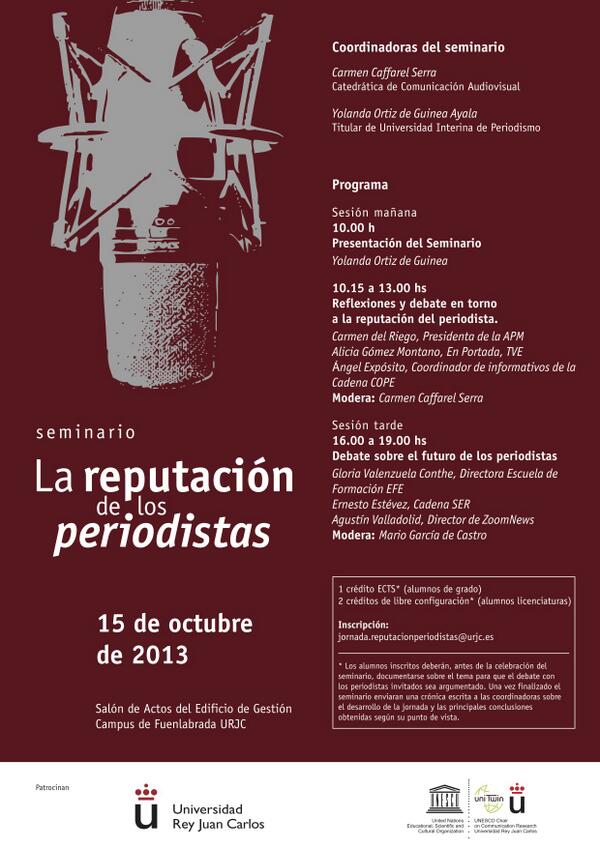
Permanent seminar (I)
Professor Fackson Banda
The professor. Fackson Banda (UNESCO) talked about some topics raised on the media landscape and the African reality. Among his most relevant ideas to guide the journalist's future, we highlight three:
- develop a civic role: journalists are not only transmitters, they acquire a social and civic responsibility in their work.
- develop the epistemic role: be able to generate knowledge, make sense to the big amount of data, interpret the reality in a meaningful way for people.
- promoters of development processes: journalists as agents facilitating development, social transformation and people's empowerment.
In order of appearance:
- Donato Ndongo: "Double standards protects perverse behaviors in Africa"
- Mbuyi Kabunda: "Is there a Human Rights tradition in Africa?»
- "Diversity and Freedom of Expression in Africa”, by Professor Antoni Castel
- Carlos Bajo talks about the environment 2.0 in Africa
- Lucia Benitez: "Black feminism has an incredible strength '
II International Colloquium ‘Cultural Mutation, Communication and Crisis ’
coordinate: Mr. Rainer Rubira García and Dra. Jacqueline Venet Gutiérrez
- Day: 12 November 2022
- Duration: 6 hours (8:00h-14:00h)
- Credits: 0,3 ECTS
- I International Colloquium Cultural Mutation: Online/Mixta.
- Access the program
- registration here
- connection link
Within the framework of the IV CALL FOR THE PROMOTION OF INNOVATION AND IMPROVEMENT OF TEACHING 2022, Communication Sciences Faculty, and the CALL FOR AID FOR THE ORGANIZATION OF CONGRESSES, CONFERENCES AND SEMINARS 2022, Vice President for University Extension of the URJC, is celebrated on II International Colloquium ‘Cultural Mutation, Communication and Crisis ’.
The speakers of the Colloquium, specialists from different latitudes and disciplines, They will offer master conferences on one of the issues or the convergence of the three thematic axes covered by the event: cultural mutations, communication and crises. Thus, Topics such as negotiation strategies in the audiovisual industry will be addressed, cultural representations and gender perspectives in contemporary cinema, the principles of intercultural communication and motherhood and patriarchy in post-apocalyptic cinema.
Summer course: Domestic cookbooks as an intercultural and intergenerational communication resource
Hosted by Yanet Acosta
- Day: 7 July 2022
- Hour: 09:00
- Place: Old sign of Pavia, Aranjuez
- Credits: 0,4 ECTS
- Access the program
Gastronomy is a component of great relevance in identity and is part of the intangible heritage of humanity and recipe books are living documents of the historical evolution of a society. Nevertheless, academic and research attention has always been focused on those compilations printed over the centuries, largely at the hands of men in charge of the kitchen for the political and religious spheres, thus neglecting what has been the main contribution of women to this heritage: domestic handwritten cookbooks.
Since 1989 The silent and often despised testimony of these cookbooks has begun to be the object of academic study by the Anglo-Saxon university with representatives such as Susan Leonardi, Janet Floyd y Laurel Forster y Janet Teophano, Cara de Silva and Anne L. Bower y Rebecca Ingram y Lara Anderson.
The investigations of the domestic cookbook in Spanish are signed by Isabel Gómez Turmo, Maria Angeles Perez Samper and Maria Paz Moreno. To his studies is added the publication in 2013 by the publishing house Viewer of Book of notes of stews and sweets, a recipe book dated around the year 1740 and signed by María Rosa Calvillo de Teruel, that collects a selection of handwritten recipes of a domestic nature of great historical value to understand the culinary uses and customs in the bourgeois homes of the 18th century in Andalusia.
Following this impulse in various Spanish autonomous communities, work has begun to search and catalog this documentation, which is increasingly receiving greater consideration.. Among other rescue initiatives, localization and disclosure include the project of the research team "Palingestos" of the University of La Laguna, in which the URJC UNESCO Chair in Communication Research also participates through one of its researchers, and what is called recetascanarias.org
put in common working methodologies and disseminating the relevance of this heritage which is an intergenerational and intercultural communication resource, mostly among women, is the goal of this summer course, as well as transferring this knowledge to professional cooks and to those who wish to launch recovery projects for this type of cultural heritage.
I Seminar on Suicide Prevention: Let's talk about suicide, let's break the taboo.
Coordinated by the Animals and Society Chair
- Day: 10 June 2022
- Hour: 09:00
- Place: Of. from athens, s/n
- Credits: 0,5 ECTS
- Access the program
The number of suicides in 2020 in Spain grew up in 270 personas, until the 3.941 suicides, so in Spain they commit suicide on average 11 people every day. This figure means that the suicide rate in Spain is 8,31 for each 100.000 population.
For every suicide there are many more who attempt suicide or have severe suicidal ideation. Suicidal behavior has a profound impact on families and communities and remains a universal challenge affecting millions of people.. Reducing suicide mortality is of global importance and a vital public health consideration..
In this situation, the Animals and Society Chair mobilizes its resources to work together to reduce the numbers, for improving the lives behind those figures. The necessarily multidisciplinary and multi-focus approach will bring together professionals who, from different fields, contribute their vision to improve aspects such as: prevention, emotional strengthening strategies, intervention during suicidal behavior and finally the treatment of suicide in all its complexity as news.

Representational distance between expert narration and local stories: a reflection on the politics of evidence in the field of historical memory
Within the framework of the International Colloquium and Permanent Research Seminar 'Cultural Mutation, Communication and Crisis ’
- Day: 2 June 2022
- Hour: 12:00
- Place: Graduation Hall – Departmental Building, Campus of Fuenlabrada
- Access the recording of the event
The presented work analyzes the epistemological limits of the narration product of the specialized works on memory of the violent past. It is a dialectical exercise between the anthropology of violence and hermeneutic phenomenology, that proposes a self-critical look from inside the expert system. We propose the existence of a necessary representational distance (not contingent) between the story as a form of local expression and its translation into a narration that is projected outside the context in which the local stories have been produced. The article concludes that, rather than the very experience of violence represented in such stories, it is the logic of the expert system that draws the contours of the politics of evidence in the field of memory.

International Colloquium and Permanent Research Seminar ‘Cultural Mutation, Communication and Crisis ’
Coordinated by Rainer Rubira and Jacqueline Venet
- Day: 30 November 2021
- Hour: 09:00 – 15:00h
- Place: Online
- Credits: 0.30 ECTS
- Access the program
Our starting point is built around the triad communication, crisis and culture, mediated by a change that opts for a more inclusive and expansive concept of each of the sections.
A) Yes, we amplify it to bring out factors of a cultural nature, human, social, politics, economic or moral, in order to enhance humanistic derivatives. Like a palimpsest, political layers are added to the three concepts, social, cultural, that make this a global historical macro phenomenon of still unpredictable consequences. We assume the crisis as an interruption of the functioning of the usual course of daily practices, provoking, in a synchronized way, various dysfunctions in multiple social fields. This generates a general state of suspension of well-being. We discard the vision that defines it as a setback, and also as a stimulus, for the sake of assuming insecurity and accepting risks and social permutations. Crises are no longer a contextual element to be active protagonists. Of all his possible ways to describe them, we are interested in the cultural dimensions and their permutations from the different communicative processes as speeches or illustrative stories of these turbulent times.

Media Reputation Seminar: Fake News and declarative journalism
Coordinated by Yolanda Ortiz from Guinea and María Eugenia Lozano
- Day: 10 November 2021
- Hour: 09:30 – 14:30h
- Place: Seminar 244 - Departmental building I, Campus of Fuenlabrada
- Credits: 0.25 ECTS
This is the fourth seminar organized by our Chair around the reputation of the media, always from different angles and points of interest, to continue deepening this concept.
There are not a few authors who have alerted us to the use and abuse of declarative journalism. Within the profession, the journalist Arsenio Escolar described it as "one of the great evils of our trade" in an article entitled A new virus further aggravates declarative journalism, published in 2015 in the APM magazine Cuadernos de Periodistas, especially when it invades political information until it monopolizes it and makes it almost its only record. Of the abuse of statements without context or analysis by professionals, powered by social networks to misinformation, there may only be one step, or none.
This time we pretend analyze and debate with significant representatives of the national media, and verification platforms, your vision of the possible interrelation between so-called declarative journalism and Fake News.
Debate day for the renewal of the Decalogue on climate change communication
Coordinated by Gemma Teso and Carlos Lozano
The Climate Change Communication Observatory is dedicated to applied research for him development of tools that allow improving communication of the Communication on climate change. It is It constitutes a meeting space between communication professionals Climate change (CC), communication researchers and the experts in different areas of knowledge or activity linked to this climate change and ecological transition. The interaction between researchers and professionals who apply un expert and inclusive judgment reinforces the necessary bond and commitmentfor him exchange of knowledge upon the climate crisis, the eco-social context and communication of this phenomenon. The ultimate end is guarantee quality communication that empowers to the citizens Faced with the great changes that they will have to face to combat global warming and adapt to the new living conditions that will bring us an increase set at least by the IPCC at + 1.5ºC.
A selection of 36 experts to be distributed in three working groups during the day. Each one of these groups will consist of communication professionals Climate change (CC), especially environmental journalists from different media and supports and experts in different areas of knowledge or activity linked to this climate change and ecological transition:scientists specialized in climate science, socioitdog, psychologists, political scientists, entrepreneurs and climate activists and representatives of the main institutions. The communication researchers of the Observatory they will moderate the debates and supervise the development of the day.
- Day: 2 October 2021
- Hour: 09:00 – 15:00h
- Place: Madrid-Quintana Headquarters


Gastronomic journalism conference, research and intercultural communication
Coordinated by María Yanet Acosta Meneses
The newly appointed by President-elect Joe Biden as United States Ambassador to the UN Linda Thomas-Greenfield has revolutionized the world of diplomacy with a new term. “Gumbo Diplomacy”. In this play on words in front of the usual and hegemonic "Bunboat Diplomacy" the new African-American ambassador raised in Louisiana has put on the table the gastronomy how powerful intercultural communication tool. Gumbo is a Louisiana Creole cuisine stew resulting from the historical fusion of ingredients and cultures. Linda Thomas-Greenfield during her appointment last November explained that “wherever in the world I find myself, I invited people of different origins and beliefs to help me make roux and chop onions for the Holy Trinity of a homemade gumbo. It was my way of breaking down barriers, connect with people and start seeing myself on a human level ".
And it is from that place that the new ambassador wants to confront the interconnected conflicts in this global world such as the pandemic., the climate change crisis, mass migration and extreme poverty. Taking advantage of this current hanger, as well as the growing interest of the scientific community from the Humanities and the enthusiasm of the students before a subject that seems to be fashionable in the media, we propose these Conference.
- Day: 21 May 2021
- Hour: 10:00 – 14:00h
- Place: Online
- Credits: 0.40 ECTS
- Download the program
- Streaming of the event
- Conference Book

The management of public opinion and crisis communication in contemporary times
Coordinated by Rainer Rubira García and Jacqueline Venet Gutiérrez
This initiative aims to focus on communication processes for the management of public opinion in crisis situations from an innovative point of view. We propose to address aspects have as thread understand, reflect on and interpret the boundaries between communication, public opinion and crisis management, as convergent and complementary fields. The mission of the activity that we propose could be summarized based on the collective interest in studying communication processes, public opinion and crisis management from an innovative point of view taking into account the impact of technologies, but also the changes in public that have occurred in the last decade.
- Day: 30 November 2020
- Hour: 9:00-14:00h
- Place: Online
- Credits: 0.30 ECTS
- Download the program
- Download program in English
- Download poster in English

MapCom Latinoamérica: proposals to configure an interactive communication research map
XV Congress of the Latin American Association of Communication Researchers (ALAIC)
Panel with specialists to present the main results of the MapCom project about communication research (2007-2018) in Spanish universities: doctoral thesis, R&D projects, Scientific articles, books, communications to congresses and research groups and, at the same time, learn about and discuss the initiatives and contributions that other Latin American researchers are making in the same direction.
The main objectives pursued in this event is to establish strategies and methodologies for the design of geomatic maps that can become a working tool for all Ibero-American researchers focused on communication research..
- Day: 17 November 2020
- Hour: 8:00 hours (Colombia) – 14:00 hours (Spain)
- Place: Online

Innovation and creativity in and from the field of social communication
Rainer coordinated by Rubira
Creativity processes have attracted academic interest as an object of study in the field of Communication Sciences long. With the advent of communication technologies, the study of these phenomena has only grown in importance. For this reason, This initiative aims to focus on the processes of creation and from the communication from an innovative standpoint. We propose to address aspects have as thread understand, reflect and interpret the boundaries between communication and creativity, as convergent and complementary fields.
The mission of the activity we propose is warranted from the need to study and systematize experiences in relationships between the processes of communication and creation from an innovative standpoint taking, consider the impact of technology, but also the changes in public that have occurred in the last decade.
- Day: 25 November 2019
- Hour: 09:00 – 14:00h
- Place: Communication Sciences Faculty, Campus of Fuenlabrada - Lecture 1, Aula Magna 007
- Credits: 0.25 ECTS
- Download the program

The transposition of the Directive on Audiovisual Communication Services: new scenario, new rules
Coordinated by Mae Lozano, Carmen Caffarel and Alejandro Perales
The aim of this conference is analyze changes in the audiovisual scene associated with the transposition into Spanish law of Directive (EU) 2018/1808 European Parliament and Council, of 14 of November, amending Directive audiovisual media services amending.
The round tables with the participation of experts, Administration and service providers audiovisual communication.
- Cristina Morales Door, Deputy Director General Contents Information Society, Secretary of State for the Digital Advance (SEAD).
- José Angel García Cabrera, Audiovisual deputy director of the National Commission for Markets and Competition (CNMC).
- Roger Loppacher and Crehuet, President of the Audiovisual Council of Catalonia (CAC).
- Joaquín Durán Ayo, Member of the Audiovisual Council of Andalusia (THAT:A).
- Carmen Garcia Amores, Director General of Castilla La Mancha Media on behalf of the FORTA.
- Eduardo Olano Codesido, President of the Union of Commercial Television in Open (UTECA).
- Carolina Godayol Disario, President CONECTA, Theme Channels Association.
- Antonio Vargas Cano, Public Policy Manager de Google.
- Angel Garcia Castillejo, Lawyer specializing in audiovisual.
- Maria Angeles Lopez Lobatón, Director of the Legal Department of Telefónica Digital Audiovisual.
-
- Day: 13 November 2019
- Hour: 9:00 – 14:00
- Place: • Madrid-based Arguelles Calle de Quintana, 21, 28008 Madrid
- Credits: 0,25 ECTS
- Download the program
Reputation Media: traditional media versus digital media
This conference aims to analyze and discuss with representatives meanings the national media and, both traditional and digital natives, his vision on reputation of both types of the media in Spain.
- Day: 13 November 2018
- Hour: 09:30 am
- Place: Salón de actos – Gestión, Campus of Fuenlabrada
- Credits: 0.25 ECTS
- Download the program

Reputation Media Communication. Dialogue between professionals and the University
It is available the presentation about "Social Media and Human Rights in Africa", from the Researcher Carlos Bajo Erro, which took place as a part of our event Africa: Communication and Human Rights Education, So close and yet so far.
The presentation can be consulted here.
- Day: 13 November 2017
- Hour: 10:00 am
- Place: Salón de actos – Gestión, Campus of Fuenlabrada
- Credits: 0.25 ECTS
- Download the program

The actual Political Communication: new players, speeches and scenarios
I Ibero-American Forum of UNESCO Chairs in Communication
In order to create a space for an academic dialogue, reflection and analysis on communication and connection with citizens, the Faculty of Communication at the University of Lima inaugurated the I Iberoamerican Forum of UNESCO Chairs in Communication. Our Chair participates with a presentation by our director Carmen Caffarel.
- Days: 10 and 11 May 2016
- Place: Central Auditorium of the University of Lima, Peru.
- Download the program

Journalists reputation
- Day: 15 October 2013
- Place: Salón de actos – Gestión, Campus of Fuenlabrada
- Inscription: Complete this form
- Information: jornada.reputacionperiodistas@urjc.es

Permanent seminar (I)
Professor Fackson Banda
The professor. Fackson Banda (UNESCO) talked about some topics raised on the media landscape and the African reality. Among his most relevant ideas to guide the journalist's future, we highlight three:
- develop a civic role: journalists are not only transmitters, they acquire a social and civic responsibility in their work.
- develop the epistemic role: be able to generate knowledge, make sense to the big amount of data, interpret the reality in a meaningful way for people.
- promoters of development processes: journalists as agents facilitating development, social transformation and people's empowerment.
In order of appearance:
- Donato Ndongo: "Double standards protects perverse behaviors in Africa"
- Mbuyi Kabunda: "Is there a Human Rights tradition in Africa?»
- "Diversity and Freedom of Expression in Africa”, by Professor Antoni Castel
- Carlos Bajo talks about the environment 2.0 in Africa
- Lucia Benitez: "Black feminism has an incredible strength '
II International Colloquium ‘Cultural Mutation, Communication and Crisis ’
coordinate: Mr. Rainer Rubira García and Dra. Jacqueline Venet Gutiérrez
- Day: 11 November 2022
- Duration: 6 hours (8:00h-14:00h)
- Credits: 0,3 ECTS
- I International Colloquium Cultural Mutation: Online/Mixta.
- Access the program
- registration here
- connection link
Within the framework of the IV CALL FOR THE PROMOTION OF INNOVATION AND IMPROVEMENT OF TEACHING 2022, Communication Sciences Faculty, and the CALL FOR AID FOR THE ORGANIZATION OF CONGRESSES, CONFERENCES AND SEMINARS 2022, Vice President for University Extension of the URJC, is celebrated on II International Colloquium ‘Cultural Mutation, Communication and Crisis ’.
The speakers of the Colloquium, specialists from different latitudes and disciplines, They will offer master conferences on one of the issues or the convergence of the three thematic axes covered by the event: cultural mutations, communication and crises. Thus, Topics such as negotiation strategies in the audiovisual industry will be addressed, cultural representations and gender perspectives in contemporary cinema, the principles of intercultural communication and motherhood and patriarchy in post-apocalyptic cinema.
Summer course: Domestic cookbooks as an intercultural and intergenerational communication resource
Hosted by Yanet Acosta
- Day: 7 July 2022
- Hour: 09:00
- Place: Old sign of Pavia, Aranjuez
- Credits: 0,4 ECTS
- Access the program
Gastronomy is a component of great relevance in identity and is part of the intangible heritage of humanity and recipe books are living documents of the historical evolution of a society. Nevertheless, academic and research attention has always been focused on those compilations printed over the centuries, largely at the hands of men in charge of the kitchen for the political and religious spheres, thus neglecting what has been the main contribution of women to this heritage: domestic handwritten cookbooks.
Since 1989 The silent and often despised testimony of these cookbooks has begun to be the object of academic study by the Anglo-Saxon university with representatives such as Susan Leonardi, Janet Floyd y Laurel Forster y Janet Teophano, Cara de Silva and Anne L. Bower y Rebecca Ingram y Lara Anderson.
The investigations of the domestic cookbook in Spanish are signed by Isabel Gómez Turmo, Maria Angeles Perez Samper and Maria Paz Moreno. To his studies is added the publication in 2013 by the publishing house Viewer of Book of notes of stews and sweets, a recipe book dated around the year 1740 and signed by María Rosa Calvillo de Teruel, that collects a selection of handwritten recipes of a domestic nature of great historical value to understand the culinary uses and customs in the bourgeois homes of the 18th century in Andalusia.
Following this impulse in various Spanish autonomous communities, work has begun to search and catalog this documentation, which is increasingly receiving greater consideration.. Among other rescue initiatives, localization and disclosure include the project of the research team "Palingestos" of the University of La Laguna, in which the URJC UNESCO Chair in Communication Research also participates through one of its researchers, and what is called recetascanarias.org
put in common working methodologies and disseminating the relevance of this heritage which is an intergenerational and intercultural communication resource, mostly among women, is the goal of this summer course, as well as transferring this knowledge to professional cooks and to those who wish to launch recovery projects for this type of cultural heritage.
I Seminar on Suicide Prevention: Let's talk about suicide, let's break the taboo.
Coordinated by the Animals and Society Chair
- Day: 10 June 2022
- Hour: 09:00
- Place: Of. from athens, s/n
- Credits: 0,5 ECTS
- Access the program
The number of suicides in 2020 in Spain grew up in 270 personas, until the 3.941 suicides, so in Spain they commit suicide on average 11 people every day. This figure means that the suicide rate in Spain is 8,31 for each 100.000 population.
For every suicide there are many more who attempt suicide or have severe suicidal ideation. Suicidal behavior has a profound impact on families and communities and remains a universal challenge affecting millions of people.. Reducing suicide mortality is of global importance and a vital public health consideration..
In this situation, the Animals and Society Chair mobilizes its resources to work together to reduce the numbers, for improving the lives behind those figures. The necessarily multidisciplinary and multi-focus approach will bring together professionals who, from different fields, contribute their vision to improve aspects such as: prevention, emotional strengthening strategies, intervention during suicidal behavior and finally the treatment of suicide in all its complexity as news.

Representational distance between expert narration and local stories: a reflection on the politics of evidence in the field of historical memory
Within the framework of the International Colloquium and Permanent Research Seminar 'Cultural Mutation, Communication and Crisis ’
- Day: 2 June 2022
- Hour: 12:00
- Place: Graduation Hall – Departmental Building, Campus of Fuenlabrada
- Access the recording of the event
The presented work analyzes the epistemological limits of the narration product of the specialized works on memory of the violent past. It is a dialectical exercise between the anthropology of violence and hermeneutic phenomenology, that proposes a self-critical look from inside the expert system. We propose the existence of a necessary representational distance (not contingent) between the story as a form of local expression and its translation into a narration that is projected outside the context in which the local stories have been produced. The article concludes that, rather than the very experience of violence represented in such stories, it is the logic of the expert system that draws the contours of the politics of evidence in the field of memory.

International Colloquium and Permanent Research Seminar ‘Cultural Mutation, Communication and Crisis ’
Coordinated by Rainer Rubira and Jacqueline Venet
- Day: 30 November 2021
- Hour: 09:00 – 15:00h
- Place: Online
- Credits: 0.30 ECTS
- Access the program
Our starting point is built around the triad communication, crisis and culture, mediated by a change that opts for a more inclusive and expansive concept of each of the sections.
A) Yes, we amplify it to bring out factors of a cultural nature, human, social, politics, economic or moral, in order to enhance humanistic derivatives. Like a palimpsest, political layers are added to the three concepts, social, cultural, that make this a global historical macro phenomenon of still unpredictable consequences. We assume the crisis as an interruption of the functioning of the usual course of daily practices, provoking, in a synchronized way, various dysfunctions in multiple social fields. This generates a general state of suspension of well-being. We discard the vision that defines it as a setback, and also as a stimulus, for the sake of assuming insecurity and accepting risks and social permutations. Crises are no longer a contextual element to be active protagonists. Of all his possible ways to describe them, we are interested in the cultural dimensions and their permutations from the different communicative processes as speeches or illustrative stories of these turbulent times.

Media Reputation Seminar: Fake News and declarative journalism
Coordinated by Yolanda Ortiz from Guinea and María Eugenia Lozano
- Day: 10 November 2021
- Hour: 09:30 – 14:30h
- Place: Seminar 244 - Departmental building I, Campus of Fuenlabrada
- Credits: 0.25 ECTS
This is the fourth seminar organized by our Chair around the reputation of the media, always from different angles and points of interest, to continue deepening this concept.
There are not a few authors who have alerted us to the use and abuse of declarative journalism. Within the profession, the journalist Arsenio Escolar described it as "one of the great evils of our trade" in an article entitled A new virus further aggravates declarative journalism, published in 2015 in the APM magazine Cuadernos de Periodistas, especially when it invades political information until it monopolizes it and makes it almost its only record. Of the abuse of statements without context or analysis by professionals, powered by social networks to misinformation, there may only be one step, or none.
This time we pretend analyze and debate with significant representatives of the national media, and verification platforms, your vision of the possible interrelation between so-called declarative journalism and Fake News.
Debate day for the renewal of the Decalogue on climate change communication
Coordinated by Gemma Teso and Carlos Lozano
The Climate Change Communication Observatory is dedicated to applied research for him development of tools that allow improving communication of the Communication on climate change. It is It constitutes a meeting space between communication professionals Climate change (CC), communication researchers and the experts in different areas of knowledge or activity linked to this climate change and ecological transition. The interaction between researchers and professionals who apply un expert and inclusive judgment reinforces the necessary bond and commitmentfor him exchange of knowledge upon the climate crisis, the eco-social context and communication of this phenomenon. The ultimate end is guarantee quality communication that empowers to the citizens Faced with the great changes that they will have to face to combat global warming and adapt to the new living conditions that will bring us an increase set at least by the IPCC at + 1.5ºC.
A selection of 36 experts to be distributed in three working groups during the day. Each one of these groups will consist of communication professionals Climate change (CC), especially environmental journalists from different media and supports and experts in different areas of knowledge or activity linked to this climate change and ecological transition:scientists specialized in climate science, socioitdog, psychologists, political scientists, entrepreneurs and climate activists and representatives of the main institutions. The communication researchers of the Observatory they will moderate the debates and supervise the development of the day.
- Day: 2 October 2021
- Hour: 09:00 – 15:00h
- Place: Madrid-Quintana Headquarters


Gastronomic journalism conference, research and intercultural communication
Coordinated by María Yanet Acosta Meneses
The newly appointed by President-elect Joe Biden as United States Ambassador to the UN Linda Thomas-Greenfield has revolutionized the world of diplomacy with a new term. “Gumbo Diplomacy”. In this play on words in front of the usual and hegemonic "Bunboat Diplomacy" the new African-American ambassador raised in Louisiana has put on the table the gastronomy how powerful intercultural communication tool. Gumbo is a Louisiana Creole cuisine stew resulting from the historical fusion of ingredients and cultures. Linda Thomas-Greenfield during her appointment last November explained that “wherever in the world I find myself, I invited people of different origins and beliefs to help me make roux and chop onions for the Holy Trinity of a homemade gumbo. It was my way of breaking down barriers, connect with people and start seeing myself on a human level ".
And it is from that place that the new ambassador wants to confront the interconnected conflicts in this global world such as the pandemic., the climate change crisis, mass migration and extreme poverty. Taking advantage of this current hanger, as well as the growing interest of the scientific community from the Humanities and the enthusiasm of the students before a subject that seems to be fashionable in the media, we propose these Conference.
- Day: 21 May 2021
- Hour: 10:00 – 14:00h
- Place: Online
- Credits: 0.40 ECTS
- Download the program
- Streaming of the event
- Conference Book

The management of public opinion and crisis communication in contemporary times
Coordinated by Rainer Rubira García and Jacqueline Venet Gutiérrez
This initiative aims to focus on communication processes for the management of public opinion in crisis situations from an innovative point of view. We propose to address aspects have as thread understand, reflect on and interpret the boundaries between communication, public opinion and crisis management, as convergent and complementary fields. The mission of the activity that we propose could be summarized based on the collective interest in studying communication processes, public opinion and crisis management from an innovative point of view taking into account the impact of technologies, but also the changes in public that have occurred in the last decade.
- Day: 30 November 2020
- Hour: 9:00-14:00h
- Place: Online
- Credits: 0.30 ECTS
- Download the program
- Download program in English
- Download poster in English

MapCom Latinoamérica: proposals to configure an interactive communication research map
XV Congress of the Latin American Association of Communication Researchers (ALAIC)
Panel with specialists to present the main results of the MapCom project about communication research (2007-2018) in Spanish universities: doctoral thesis, R&D projects, Scientific articles, books, communications to congresses and research groups and, at the same time, learn about and discuss the initiatives and contributions that other Latin American researchers are making in the same direction.
The main objectives pursued in this event is to establish strategies and methodologies for the design of geomatic maps that can become a working tool for all Ibero-American researchers focused on communication research..
- Day: 17 November 2020
- Hour: 8:00 hours (Colombia) – 14:00 hours (Spain)
- Place: Online

Innovation and creativity in and from the field of social communication
Rainer coordinated by Rubira
Creativity processes have attracted academic interest as an object of study in the field of Communication Sciences long. With the advent of communication technologies, the study of these phenomena has only grown in importance. For this reason, This initiative aims to focus on the processes of creation and from the communication from an innovative standpoint. We propose to address aspects have as thread understand, reflect and interpret the boundaries between communication and creativity, as convergent and complementary fields.
The mission of the activity we propose is warranted from the need to study and systematize experiences in relationships between the processes of communication and creation from an innovative standpoint taking, consider the impact of technology, but also the changes in public that have occurred in the last decade.
- Day: 25 November 2019
- Hour: 09:00 – 14:00h
- Place: Communication Sciences Faculty, Campus of Fuenlabrada - Lecture 1, Aula Magna 007
- Credits: 0.25 ECTS
- Download the program

The transposition of the Directive on Audiovisual Communication Services: new scenario, new rules
Coordinated by Mae Lozano, Carmen Caffarel and Alejandro Perales
The aim of this conference is analyze changes in the audiovisual scene associated with the transposition into Spanish law of Directive (EU) 2018/1808 European Parliament and Council, of 14 of November, amending Directive audiovisual media services amending.
The round tables with the participation of experts, Administration and service providers audiovisual communication.
- Cristina Morales Door, Deputy Director General Contents Information Society, Secretary of State for the Digital Advance (SEAD).
- José Angel García Cabrera, Audiovisual deputy director of the National Commission for Markets and Competition (CNMC).
- Roger Loppacher and Crehuet, President of the Audiovisual Council of Catalonia (CAC).
- Joaquín Durán Ayo, Member of the Audiovisual Council of Andalusia (THAT:A).
- Carmen Garcia Amores, Director General of Castilla La Mancha Media on behalf of the FORTA.
- Eduardo Olano Codesido, President of the Union of Commercial Television in Open (UTECA).
- Carolina Godayol Disario, President CONECTA, Theme Channels Association.
- Antonio Vargas Cano, Public Policy Manager de Google.
- Angel Garcia Castillejo, Lawyer specializing in audiovisual.
- Maria Angeles Lopez Lobatón, Director of the Legal Department of Telefónica Digital Audiovisual.
-
- Day: 13 November 2019
- Hour: 9:00 – 14:00
- Place: • Madrid-based Arguelles Calle de Quintana, 21, 28008 Madrid
- Credits: 0,25 ECTS
- Download the program
Reputation Media: traditional media versus digital media
This conference aims to analyze and discuss with representatives meanings the national media and, both traditional and digital natives, his vision on reputation of both types of the media in Spain.
- Day: 13 November 2018
- Hour: 09:30 am
- Place: Salón de actos – Gestión, Campus of Fuenlabrada
- Credits: 0.25 ECTS
- Download the program

Reputation Media Communication. Dialogue between professionals and the University
It is available the presentation about "Social Media and Human Rights in Africa", from the Researcher Carlos Bajo Erro, which took place as a part of our event Africa: Communication and Human Rights Education, So close and yet so far.
The presentation can be consulted here.
- Day: 13 November 2017
- Hour: 10:00 am
- Place: Salón de actos – Gestión, Campus of Fuenlabrada
- Credits: 0.25 ECTS
- Download the program

The actual Political Communication: new players, speeches and scenarios
I Ibero-American Forum of UNESCO Chairs in Communication
In order to create a space for an academic dialogue, reflection and analysis on communication and connection with citizens, the Faculty of Communication at the University of Lima inaugurated the I Iberoamerican Forum of UNESCO Chairs in Communication. Our Chair participates with a presentation by our director Carmen Caffarel.
- Days: 10 and 11 May 2016
- Place: Central Auditorium of the University of Lima, Peru.
- Download the program

Journalists reputation
- Day: 15 October 2013
- Place: Salón de actos – Gestión, Campus of Fuenlabrada
- Inscription: Complete this form
- Information: jornada.reputacionperiodistas@urjc.es

Permanent seminar (I)
Professor Fackson Banda
The professor. Fackson Banda (UNESCO) talked about some topics raised on the media landscape and the African reality. Among his most relevant ideas to guide the journalist's future, we highlight three:
- develop a civic role: journalists are not only transmitters, they acquire a social and civic responsibility in their work.
- develop the epistemic role: be able to generate knowledge, make sense to the big amount of data, interpret the reality in a meaningful way for people.
- promoters of development processes: journalists as agents facilitating development, social transformation and people's empowerment.
In order of appearance:
- Donato Ndongo: "Double standards protects perverse behaviors in Africa"
- Mbuyi Kabunda: "Is there a Human Rights tradition in Africa?»
- "Diversity and Freedom of Expression in Africa”, by Professor Antoni Castel
- Carlos Bajo talks about the environment 2.0 in Africa
- Lucia Benitez: "Black feminism has an incredible strength '
II International Colloquium ‘Cultural Mutation, Communication and Crisis ’
coordinate: Mr. Rainer Rubira García and Dra. Jacqueline Venet Gutiérrez
- Day: 12 November 2022
- Duration: 6 hours (8:00h-14:00h)
- Credits: 0,3 ECTS
- I International Colloquium Cultural Mutation: Online/Mixta.
- Access the program
- registration here
- connection link
Within the framework of the IV CALL FOR THE PROMOTION OF INNOVATION AND IMPROVEMENT OF TEACHING 2022, Communication Sciences Faculty, and the CALL FOR AID FOR THE ORGANIZATION OF CONGRESSES, CONFERENCES AND SEMINARS 2022, Vice President for University Extension of the URJC, is celebrated on II International Colloquium ‘Cultural Mutation, Communication and Crisis ’.
The speakers of the Colloquium, specialists from different latitudes and disciplines, They will offer master conferences on one of the issues or the convergence of the three thematic axes covered by the event: cultural mutations, communication and crises. Thus, Topics such as negotiation strategies in the audiovisual industry will be addressed, cultural representations and gender perspectives in contemporary cinema, the principles of intercultural communication and motherhood and patriarchy in post-apocalyptic cinema.
Summer course: Domestic cookbooks as an intercultural and intergenerational communication resource
Hosted by Yanet Acosta
- Day: 7 July 2022
- Hour: 09:00
- Place: Old sign of Pavia, Aranjuez
- Credits: 0,4 ECTS
- Access the program
Gastronomy is a component of great relevance in identity and is part of the intangible heritage of humanity and recipe books are living documents of the historical evolution of a society. Nevertheless, academic and research attention has always been focused on those compilations printed over the centuries, largely at the hands of men in charge of the kitchen for the political and religious spheres, thus neglecting what has been the main contribution of women to this heritage: domestic handwritten cookbooks.
Since 1989 The silent and often despised testimony of these cookbooks has begun to be the object of academic study by the Anglo-Saxon university with representatives such as Susan Leonardi, Janet Floyd y Laurel Forster y Janet Teophano, Cara de Silva and Anne L. Bower y Rebecca Ingram y Lara Anderson.
The investigations of the domestic cookbook in Spanish are signed by Isabel Gómez Turmo, Maria Angeles Perez Samper and Maria Paz Moreno. To his studies is added the publication in 2013 by the publishing house Viewer of Book of notes of stews and sweets, a recipe book dated around the year 1740 and signed by María Rosa Calvillo de Teruel, that collects a selection of handwritten recipes of a domestic nature of great historical value to understand the culinary uses and customs in the bourgeois homes of the 18th century in Andalusia.
Following this impulse in various Spanish autonomous communities, work has begun to search and catalog this documentation, which is increasingly receiving greater consideration.. Among other rescue initiatives, localization and disclosure include the project of the research team "Palingestos" of the University of La Laguna, in which the URJC UNESCO Chair in Communication Research also participates through one of its researchers, and what is called recetascanarias.org
put in common working methodologies and disseminating the relevance of this heritage which is an intergenerational and intercultural communication resource, mostly among women, is the goal of this summer course, as well as transferring this knowledge to professional cooks and to those who wish to launch recovery projects for this type of cultural heritage.
I Seminar on Suicide Prevention: Let's talk about suicide, let's break the taboo.
Coordinated by the Animals and Society Chair
- Day: 10 June 2022
- Hour: 09:00
- Place: Of. from athens, s/n
- Credits: 0,5 ECTS
- Access the program
The number of suicides in 2020 in Spain grew up in 270 personas, until the 3.941 suicides, so in Spain they commit suicide on average 11 people every day. This figure means that the suicide rate in Spain is 8,31 for each 100.000 population.
For every suicide there are many more who attempt suicide or have severe suicidal ideation. Suicidal behavior has a profound impact on families and communities and remains a universal challenge affecting millions of people.. Reducing suicide mortality is of global importance and a vital public health consideration..
In this situation, the Animals and Society Chair mobilizes its resources to work together to reduce the numbers, for improving the lives behind those figures. The necessarily multidisciplinary and multi-focus approach will bring together professionals who, from different fields, contribute their vision to improve aspects such as: prevention, emotional strengthening strategies, intervention during suicidal behavior and finally the treatment of suicide in all its complexity as news.

Representational distance between expert narration and local stories: a reflection on the politics of evidence in the field of historical memory
Within the framework of the International Colloquium and Permanent Research Seminar 'Cultural Mutation, Communication and Crisis ’
- Day: 2 June 2022
- Hour: 12:00
- Place: Graduation Hall – Departmental Building, Campus of Fuenlabrada
- Access the recording of the event
The presented work analyzes the epistemological limits of the narration product of the specialized works on memory of the violent past. It is a dialectical exercise between the anthropology of violence and hermeneutic phenomenology, that proposes a self-critical look from inside the expert system. We propose the existence of a necessary representational distance (not contingent) between the story as a form of local expression and its translation into a narration that is projected outside the context in which the local stories have been produced. The article concludes that, rather than the very experience of violence represented in such stories, it is the logic of the expert system that draws the contours of the politics of evidence in the field of memory.

International Colloquium and Permanent Research Seminar ‘Cultural Mutation, Communication and Crisis ’
Coordinated by Rainer Rubira and Jacqueline Venet
- Day: 30 November 2021
- Hour: 09:00 – 15:00h
- Place: Online
- Credits: 0.30 ECTS
- Access the program
Our starting point is built around the triad communication, crisis and culture, mediated by a change that opts for a more inclusive and expansive concept of each of the sections.
A) Yes, we amplify it to bring out factors of a cultural nature, human, social, politics, economic or moral, in order to enhance humanistic derivatives. Like a palimpsest, political layers are added to the three concepts, social, cultural, that make this a global historical macro phenomenon of still unpredictable consequences. We assume the crisis as an interruption of the functioning of the usual course of daily practices, provoking, in a synchronized way, various dysfunctions in multiple social fields. This generates a general state of suspension of well-being. We discard the vision that defines it as a setback, and also as a stimulus, for the sake of assuming insecurity and accepting risks and social permutations. Crises are no longer a contextual element to be active protagonists. Of all his possible ways to describe them, we are interested in the cultural dimensions and their permutations from the different communicative processes as speeches or illustrative stories of these turbulent times.

Media Reputation Seminar: Fake News and declarative journalism
Coordinated by Yolanda Ortiz from Guinea and María Eugenia Lozano
- Day: 10 November 2021
- Hour: 09:30 – 14:30h
- Place: Seminar 244 - Departmental building I, Campus of Fuenlabrada
- Credits: 0.25 ECTS
This is the fourth seminar organized by our Chair around the reputation of the media, always from different angles and points of interest, to continue deepening this concept.
There are not a few authors who have alerted us to the use and abuse of declarative journalism. Within the profession, the journalist Arsenio Escolar described it as "one of the great evils of our trade" in an article entitled A new virus further aggravates declarative journalism, published in 2015 in the APM magazine Cuadernos de Periodistas, especially when it invades political information until it monopolizes it and makes it almost its only record. Of the abuse of statements without context or analysis by professionals, powered by social networks to misinformation, there may only be one step, or none.
This time we pretend analyze and debate with significant representatives of the national media, and verification platforms, your vision of the possible interrelation between so-called declarative journalism and Fake News.
Debate day for the renewal of the Decalogue on climate change communication
Coordinated by Gemma Teso and Carlos Lozano
The Climate Change Communication Observatory is dedicated to applied research for him development of tools that allow improving communication of the Communication on climate change. It is It constitutes a meeting space between communication professionals Climate change (CC), communication researchers and the experts in different areas of knowledge or activity linked to this climate change and ecological transition. The interaction between researchers and professionals who apply un expert and inclusive judgment reinforces the necessary bond and commitmentfor him exchange of knowledge upon the climate crisis, the eco-social context and communication of this phenomenon. The ultimate end is guarantee quality communication that empowers to the citizens Faced with the great changes that they will have to face to combat global warming and adapt to the new living conditions that will bring us an increase set at least by the IPCC at + 1.5ºC.
A selection of 36 experts to be distributed in three working groups during the day. Each one of these groups will consist of communication professionals Climate change (CC), especially environmental journalists from different media and supports and experts in different areas of knowledge or activity linked to this climate change and ecological transition:scientists specialized in climate science, socioitdog, psychologists, political scientists, entrepreneurs and climate activists and representatives of the main institutions. The communication researchers of the Observatory they will moderate the debates and supervise the development of the day.
- Day: 2 October 2021
- Hour: 09:00 – 15:00h
- Place: Madrid-Quintana Headquarters


Gastronomic journalism conference, research and intercultural communication
Coordinated by María Yanet Acosta Meneses
The newly appointed by President-elect Joe Biden as United States Ambassador to the UN Linda Thomas-Greenfield has revolutionized the world of diplomacy with a new term. “Gumbo Diplomacy”. In this play on words in front of the usual and hegemonic "Bunboat Diplomacy" the new African-American ambassador raised in Louisiana has put on the table the gastronomy how powerful intercultural communication tool. Gumbo is a Louisiana Creole cuisine stew resulting from the historical fusion of ingredients and cultures. Linda Thomas-Greenfield during her appointment last November explained that “wherever in the world I find myself, I invited people of different origins and beliefs to help me make roux and chop onions for the Holy Trinity of a homemade gumbo. It was my way of breaking down barriers, connect with people and start seeing myself on a human level ".
And it is from that place that the new ambassador wants to confront the interconnected conflicts in this global world such as the pandemic., the climate change crisis, mass migration and extreme poverty. Taking advantage of this current hanger, as well as the growing interest of the scientific community from the Humanities and the enthusiasm of the students before a subject that seems to be fashionable in the media, we propose these Conference.
- Day: 21 May 2021
- Hour: 10:00 – 14:00h
- Place: Online
- Credits: 0.40 ECTS
- Download the program
- Streaming of the event
- Conference Book

The management of public opinion and crisis communication in contemporary times
Coordinated by Rainer Rubira García and Jacqueline Venet Gutiérrez
This initiative aims to focus on communication processes for the management of public opinion in crisis situations from an innovative point of view. We propose to address aspects have as thread understand, reflect on and interpret the boundaries between communication, public opinion and crisis management, as convergent and complementary fields. The mission of the activity that we propose could be summarized based on the collective interest in studying communication processes, public opinion and crisis management from an innovative point of view taking into account the impact of technologies, but also the changes in public that have occurred in the last decade.
- Day: 30 November 2020
- Hour: 9:00-14:00h
- Place: Online
- Credits: 0.30 ECTS
- Download the program
- Download program in English
- Download poster in English

MapCom Latinoamérica: proposals to configure an interactive communication research map
XV Congress of the Latin American Association of Communication Researchers (ALAIC)
Panel with specialists to present the main results of the MapCom project about communication research (2007-2018) in Spanish universities: doctoral thesis, R&D projects, Scientific articles, books, communications to congresses and research groups and, at the same time, learn about and discuss the initiatives and contributions that other Latin American researchers are making in the same direction.
The main objectives pursued in this event is to establish strategies and methodologies for the design of geomatic maps that can become a working tool for all Ibero-American researchers focused on communication research..
- Day: 17 November 2020
- Hour: 8:00 hours (Colombia) – 14:00 hours (Spain)
- Place: Online

Innovation and creativity in and from the field of social communication
Rainer coordinated by Rubira
Creativity processes have attracted academic interest as an object of study in the field of Communication Sciences long. With the advent of communication technologies, the study of these phenomena has only grown in importance. For this reason, This initiative aims to focus on the processes of creation and from the communication from an innovative standpoint. We propose to address aspects have as thread understand, reflect and interpret the boundaries between communication and creativity, as convergent and complementary fields.
The mission of the activity we propose is warranted from the need to study and systematize experiences in relationships between the processes of communication and creation from an innovative standpoint taking, consider the impact of technology, but also the changes in public that have occurred in the last decade.
- Day: 25 November 2019
- Hour: 09:00 – 14:00h
- Place: Communication Sciences Faculty, Campus of Fuenlabrada - Lecture 1, Aula Magna 007
- Credits: 0.25 ECTS
- Download the program

The transposition of the Directive on Audiovisual Communication Services: new scenario, new rules
Coordinated by Mae Lozano, Carmen Caffarel and Alejandro Perales
The aim of this conference is analyze changes in the audiovisual scene associated with the transposition into Spanish law of Directive (EU) 2018/1808 European Parliament and Council, of 14 of November, amending Directive audiovisual media services amending.
The round tables with the participation of experts, Administration and service providers audiovisual communication.
- Cristina Morales Door, Deputy Director General Contents Information Society, Secretary of State for the Digital Advance (SEAD).
- José Angel García Cabrera, Audiovisual deputy director of the National Commission for Markets and Competition (CNMC).
- Roger Loppacher and Crehuet, President of the Audiovisual Council of Catalonia (CAC).
- Joaquín Durán Ayo, Member of the Audiovisual Council of Andalusia (THAT:A).
- Carmen Garcia Amores, Director General of Castilla La Mancha Media on behalf of the FORTA.
- Eduardo Olano Codesido, President of the Union of Commercial Television in Open (UTECA).
- Carolina Godayol Disario, President CONECTA, Theme Channels Association.
- Antonio Vargas Cano, Public Policy Manager de Google.
- Angel Garcia Castillejo, Lawyer specializing in audiovisual.
- Maria Angeles Lopez Lobatón, Director of the Legal Department of Telefónica Digital Audiovisual.
-
- Day: 13 November 2019
- Hour: 9:00 – 14:00
- Place: • Madrid-based Arguelles Calle de Quintana, 21, 28008 Madrid
- Credits: 0,25 ECTS
- Download the program
Reputation Media: traditional media versus digital media
This conference aims to analyze and discuss with representatives meanings the national media and, both traditional and digital natives, his vision on reputation of both types of the media in Spain.
- Day: 13 November 2018
- Hour: 09:30 am
- Place: Salón de actos – Gestión, Campus of Fuenlabrada
- Credits: 0.25 ECTS
- Download the program

Reputation Media Communication. Dialogue between professionals and the University
It is available the presentation about "Social Media and Human Rights in Africa", from the Researcher Carlos Bajo Erro, which took place as a part of our event Africa: Communication and Human Rights Education, So close and yet so far.
The presentation can be consulted here.
- Day: 13 November 2017
- Hour: 10:00 am
- Place: Salón de actos – Gestión, Campus of Fuenlabrada
- Credits: 0.25 ECTS
- Download the program

The actual Political Communication: new players, speeches and scenarios
I Ibero-American Forum of UNESCO Chairs in Communication
In order to create a space for an academic dialogue, reflection and analysis on communication and connection with citizens, the Faculty of Communication at the University of Lima inaugurated the I Iberoamerican Forum of UNESCO Chairs in Communication. Our Chair participates with a presentation by our director Carmen Caffarel.
- Days: 10 and 11 May 2016
- Place: Central Auditorium of the University of Lima, Peru.
- Download the program

Journalists reputation
- Day: 15 October 2013
- Place: Salón de actos – Gestión, Campus of Fuenlabrada
- Inscription: Complete this form
- Information: jornada.reputacionperiodistas@urjc.es

Permanent seminar (I)
Professor Fackson Banda
The professor. Fackson Banda (UNESCO) talked about some topics raised on the media landscape and the African reality. Among his most relevant ideas to guide the journalist's future, we highlight three:
- develop a civic role: journalists are not only transmitters, they acquire a social and civic responsibility in their work.
- develop the epistemic role: be able to generate knowledge, make sense to the big amount of data, interpret the reality in a meaningful way for people.
- promoters of development processes: journalists as agents facilitating development, social transformation and people's empowerment.
In order of appearance:
- Donato Ndongo: "Double standards protects perverse behaviors in Africa"
- Mbuyi Kabunda: "Is there a Human Rights tradition in Africa?»
- "Diversity and Freedom of Expression in Africa”, by Professor Antoni Castel
- Carlos Bajo talks about the environment 2.0 in Africa
- Lucia Benitez: "Black feminism has an incredible strength '


